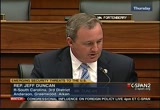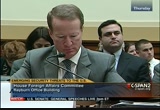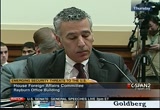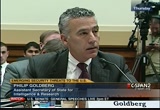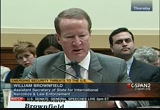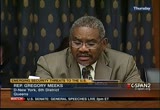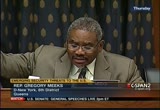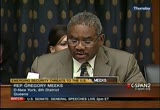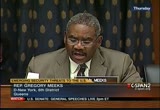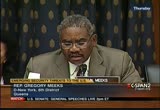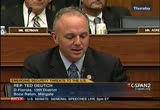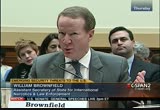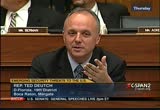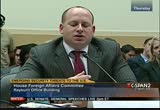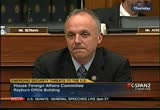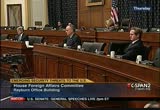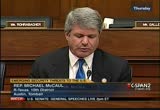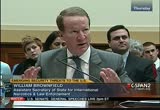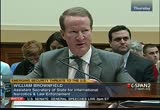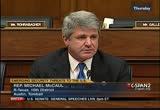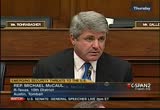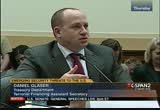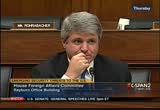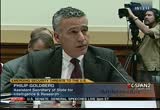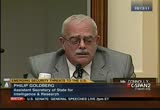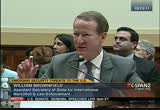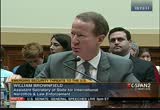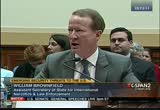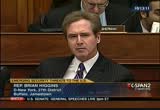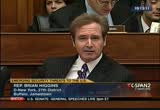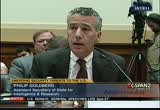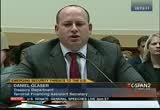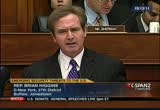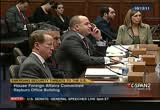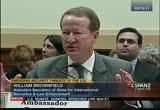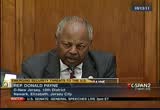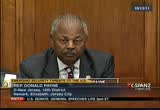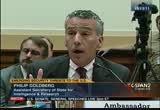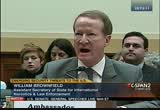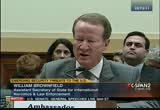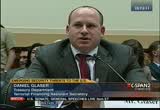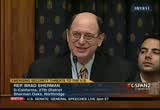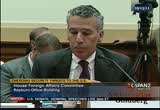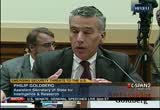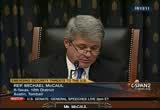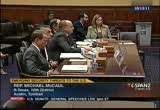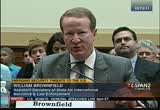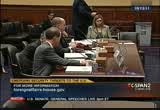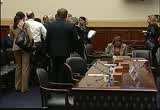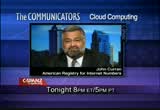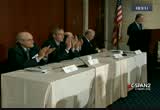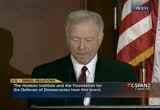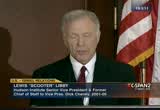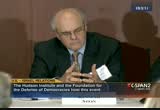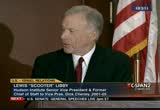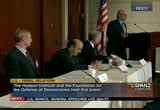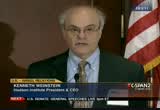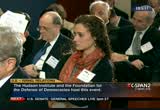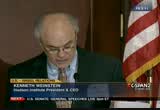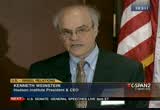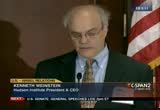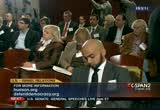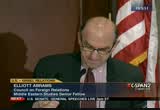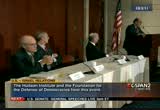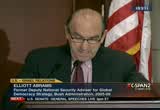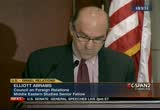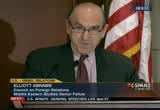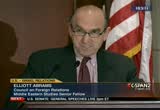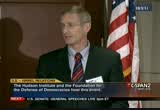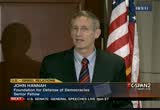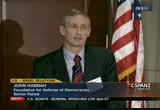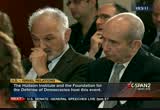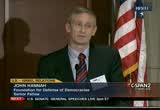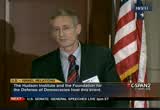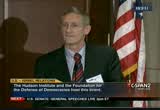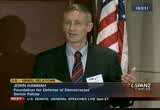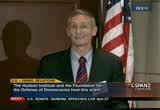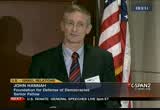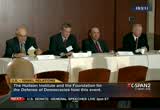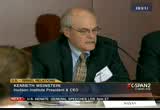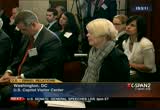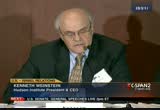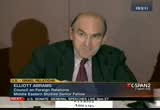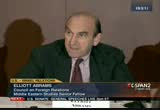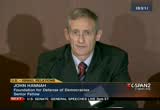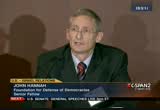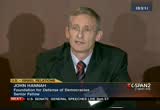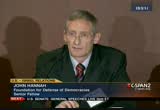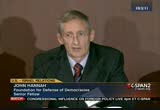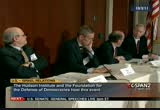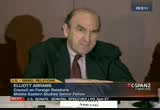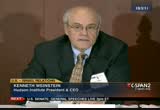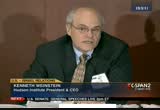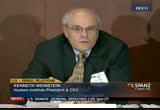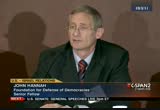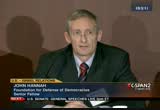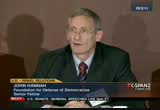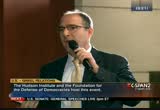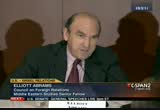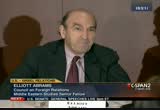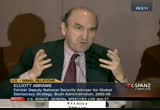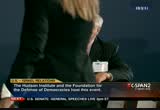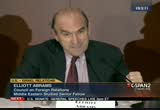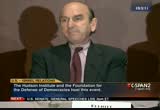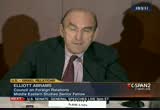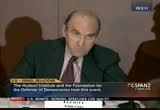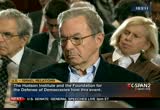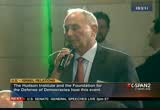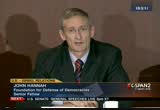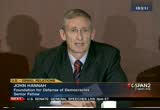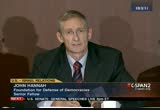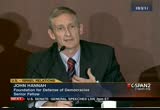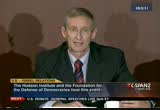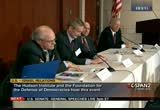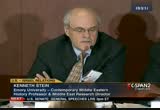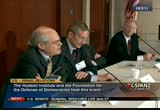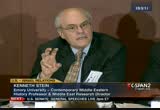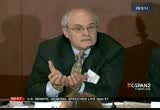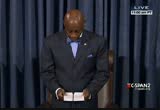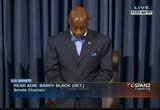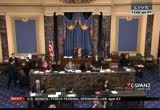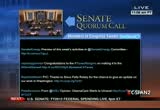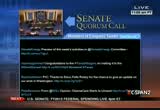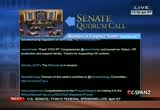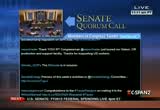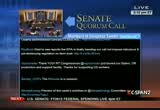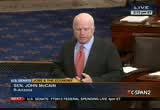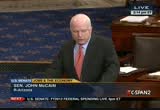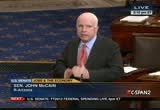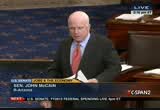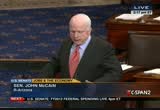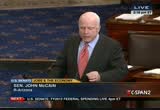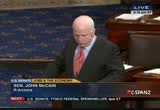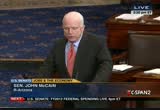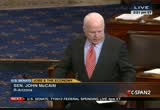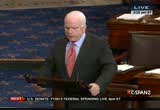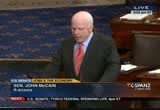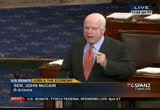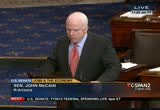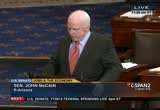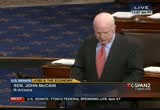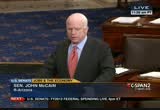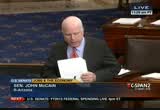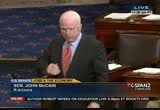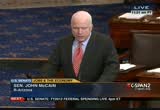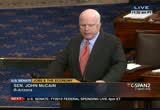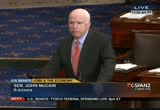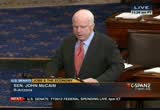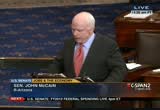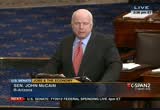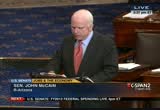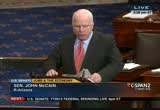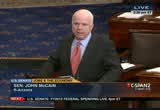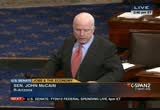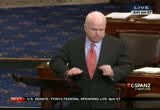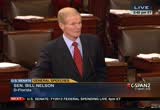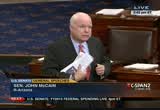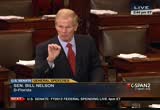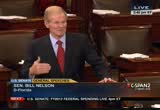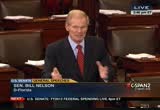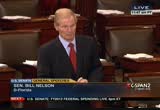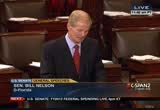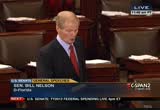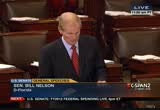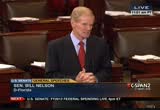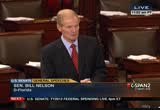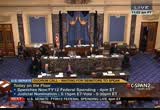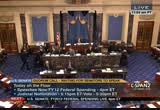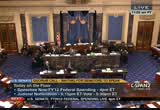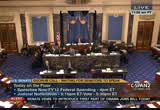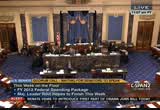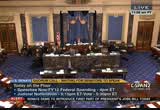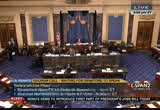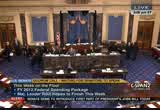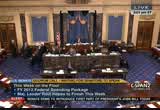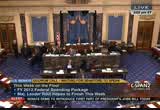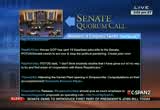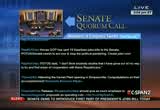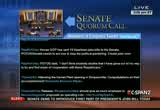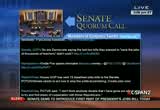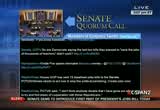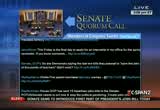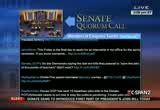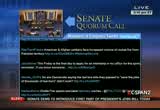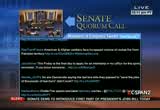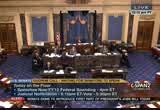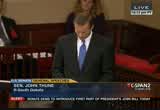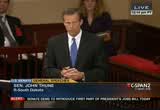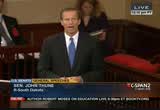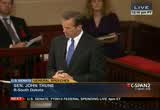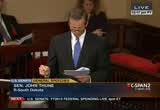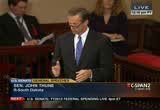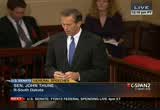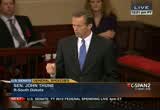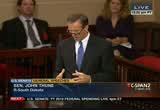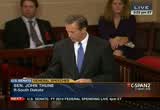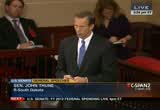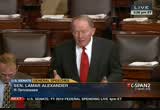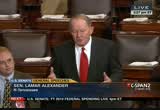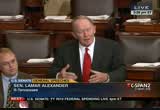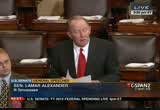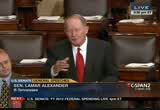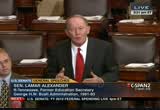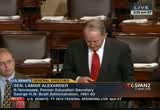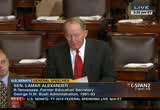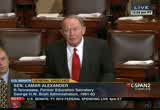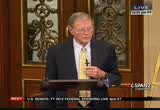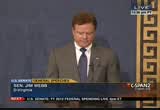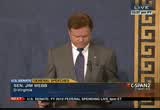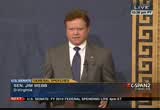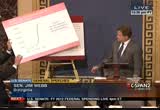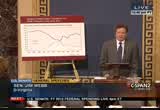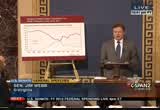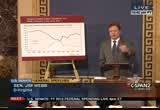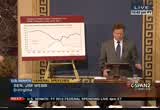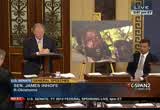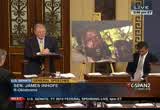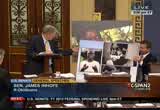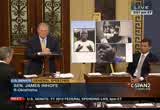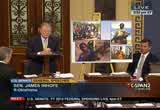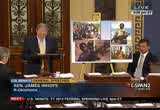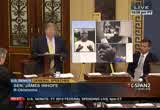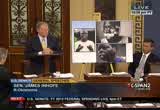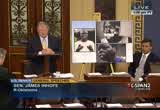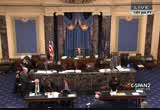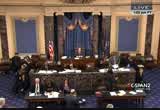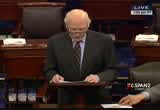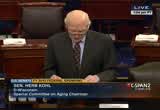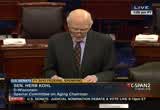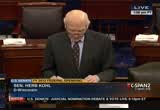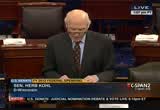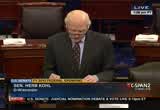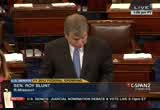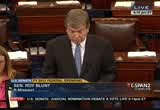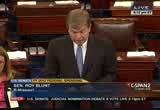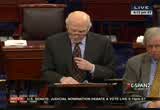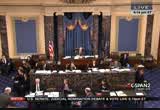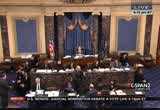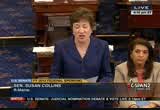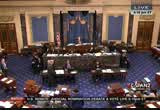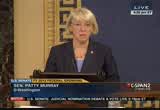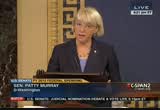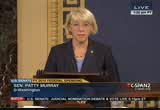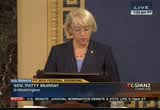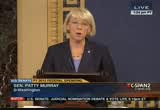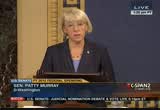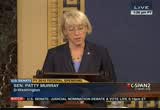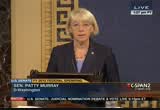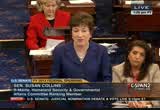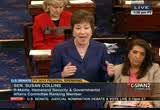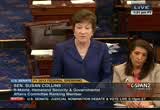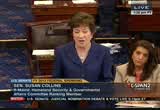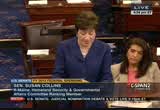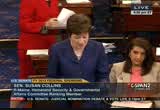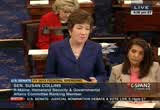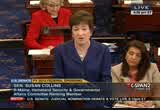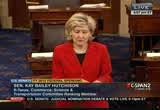tv U.S. Senate CSPAN October 17, 2011 12:00pm-5:00pm EDT
12:00 pm
proposed conduit for carrying out this assassination attempt which was foiled thankfully by the fbi this week. the relationship between hezbollah and the drug cartel already exist. and we have been trying to raise the awareness for months. .. >> it's time for us to wake up in this country that this is a real threat in the western hem --
12:01 pm
hemisphere. i want to bring to your attention that i filed on tuesday night that says we will then urge the administration, including the western hemisphere in its 2012 national strategy for counterterrorism areas of focus absent in the 2011 edition, utilizing a task force to be led by the u.s. department of homeland security and others in the community to examine iran's presence, activity, and relationships in the western hemisphere includings united states of america. >> i look forward to reading it. thank you, mr. duncan. >> thank you. mr. higgins co-sponsored this as well. it's a bipartisan issue. i want to remind ambassador brownfield we talked about this last week talking about the triborder region, the southern border, named a number of country, and you said let's not
12:02 pm
forget venezuela, one of your past posts, and i wanted to make that point as well. the question i have for the panel addressed to ambassador goldberg, how do links increase u.s. vulnerability to attack? >> the point, congressman, i was making earlier was that what's new here, and what we have found in the last few days is a renewed interest by elements within the iranian government to carry out an attack on u.s. soil, but in the hemisphere because we had seen it in earlier times. >> but it was also a back up plan possibly in beunos aires from knowledge i heard. the last attack and the largest attack prior to 9/11 happened in buenos aires with an attack on an israeli embassy. >> no, that is true.
12:03 pm
in terms of what happened, there's a case before a federal court at the moment, and we need to allow that to play out. what i think this case shows more is iran's interest in working in mexico or doing something in mexico than the other way around. >> okay. if hezbollah has a relationship with the cartels and can smuggle arms or people through our southern border, what would prevent them from bringing wmd's here? >> well, that's kind of hypothetical question, and one that clearly we watch, we monitor, we try to prevent any kind of attack or use of the hemisphere for these kinds of activities. international terrorist groups, of course, are looking for opportunities everywhere, and we have to be individual lent against them and the
12:04 pm
intelligence community and law enforcement community, that's what we do. >> yeah. in the remaining time, ambassador brownfield, can you enlighten me more on the relationship between iran and venezuela as we've seen it in the last few months? >> congressman, i've been out of venezuela now for more than four years, and as a consequence, much of my personal data is going to be somewhat dated, but i say briefly first there is a much greater presence, official presence of the iranian government in venezuela today than say ten years ago. second, there is obviously a much stronger political relationship, visits between the two presidents and engagement at senior levels than there was ten years ago. third, there is greater mutual support in organizations like the united nations, the ieae, atomic energy agency, than there
12:05 pm
was ten years ago. that is evident. it's public. it's in the media, and neither side denies it. >> thank you very much. thank you, mr. duncan. mr. meeks is recognized. the ranking member on the subcommittee of europe and euroasia. >> i see colleagues concerned about terrorism, ect.ment one of the i thinks we can all agree is that president obama has been focused and doing a very good job in fighting terrorism and terrorist coming in here and getting rid of al-qaeda and a number of the others. i mean, i think his record speaks for itself, and most americans even in the recent polls argue about it is one thing, but one thing they agree on is president obama is a focus in the way he's utilizing intelligence to make sure he keeps america safe. now, i love this hemispherement you know, i was sitting and listening, and i believe we must, indeed, examine the topic much today's hearing, but we
12:06 pm
must do so without the polarizing rhetoric remanent of policies a decade looking at the region through the cold war prism and chose our allies and interventions on that basis alone. we made poor decisions when driven by fear with a single and narrow focus in those days. this is not the time tore fearful of the developments in the the caribbean. i believe we're better served to look comprehensively at developments in the hemisphere, we can reflect on very positive and meaningful changes in recent year that show remarkable progress and process. i scolded colleagues yesterday when they wanted to look at clom -- colombia only through the past and nobody looked at where colombia is today and the improvement its made in moving forward. we have to stop just looking at
12:07 pm
the past. our hemisphere have never been this democratic. they have done most to shore up the nations. clearly, democracy is a working progress a objectives to be pursued, equal assets to opportunity, security for all segments of society, eliminating corruption and protecting human rights, and that precisely why i argued in this committee that cutting u.s. foreign aid is such a small, but important item of the budget and not in the interest to cut foreign aid. emerging threats don't just stem from outside the borders. a significant number of countries in the western hemisphere could very well hold a similar hearing from threats stemming from our own nation. if we're talking about emerging threats, include issues that resinate deeply south of the border.
12:08 pm
mr. engel talked about some, the u.s. demand for drugs, flow of guns from america, migration, trade expansion, drug embargo to name a few. there's an unacknowledged point about regional progress. we are seeing, for the first time, sighted participation in democratic life on the part of disadvantaged communities who finally feel free, feel they have a voice in a region where black and indigenous communities sferred without recourse. i speak about the united states as well. democracy's more inclusive than its ever been. for the first time in countries elected presidents born in poverty and do not come from white elite. take bolivia, for example, the majority historically population takes pride in the fact that the president morales1 the first to lead that country. the biggest threat are not the personalities labeled as
12:09 pm
demagogue. the people in our sphere who chose the leaders, the biggest threats are criminality and poverty. research indicates that our regional neighbors live more in the center politically than we are often willing to acknowledge. some of my colleagues are quick to see ideologs, but look closely, threne as pragmatists to build constructive relationships and ultimately dispel our assumptions about the simple -- without clinging to ideology. i remember a decade ago when there was a new leader on the scene in brazil. many worried about him saying he was going to be a bad guy, but we see years later after the economy was expected to tank and social chaos was to ensue, instead, we saw the movement of brazil as a rising star. of course, we must not be polyanous, there's evil doers out there, and we have to face
12:10 pm
fronts head on. our alliances with neighbors are essential so as continued engagement, continued cooperation, intelligence sharing, continued assistance to build the capacity of our neighbors, intelligence, and security institutions are continued joint operations in training. i think the glass is more than half empty. it's half full. salute our friends. i love the process that the progress of the western hemisphere. we always talk down and say bad things, but there's a lot of good thing going on, and i think that's good for all of us. >> thank you, mr. meeks. mr. deutch is recognized. >> thank you. you talked about the bombing in argentina at the time you were there. the recent foiled plot highlights iran's growing ties in the western hemisphere, but what's -- in many ways what's most troublesome is at the same
12:11 pm
time iranian officials like the prime minister travel freely in latin america. he spent time in bolivia this summer. i refer back bought mr. veheti is subject to an interpol red notice. what are we doing to prevent sanctioned officials from traveling not just to areas of concern, but skirting international sanctions by traveling under the disguy of official business. how are we addressing that, and how can we prevent it? >> congressman, you raise a very valid question. i remind you it's a question in the case that you're talking about that involved the country's of iran, argentina, and bolivia. the gentleman is currently under the equivalent of indictment in the republic of argentina for homicide related charges. at the end of the day, we are members of interpol and we
12:12 pm
support it to the extent there's a warning out there giving us and u.s. law enforcement the authority to act against an individual. we would exercise that authority. if your question is asking more what are we doing or able to do in bolivia to get that government to take certain steps while i am not responsible for bolivia, obviously, we have perhaps less ability to influence the direction that that government goes than certain other governments in the region. >> thank you. the question really is more the former. it is individuals like veheti and others that ahmadinejad, that the regime understands that the sanctions law that ban on travel can be skirted simply by appointing individuals to official positions which give them the ability to travel freely. throw it open to the other witnesses. i mean, i have suggested, and i
12:13 pm
think there are others who have looked at this that existing sanctions law gives us the opportunity to sanction perhaps not those individuals who should not be traveling, but can because of our treatly obligations and the like, but to sanction those fuel suppliers who provide the fuel for the airlines, for example. what else can we do to crack down on those who would otherwise be subject to a travel ban, but get around it by their official capacity that they -- the official title that they may hold? >> well, congressman, it's related to the question, but i think you have part of this in mind because you mentioned the whole issue relating to transportation. i mean, that is something that we take quite seriously, and it is part of our overall efforts
12:14 pm
with respect to iran. as you know, earlier this week, the treasury department diseased moh -- department designated airlines and shipping lines for sometime. i think you're thinking about this the right way. part of our efforts to squeeze iran, part of our efforts to apply pressure on iran is not just related to the financial side, but it's related to isolating iran on even broader basis than that, and from the treasury department, that's what we try to do when we target iran air and other entities. >> let me follow-up. as we go forward and look forward to the debate on further iran sanctions, given the work that you do, what's the most important, the important missing piece, what is it that would help you most that you don't currently have? >> well, i think when we look at
12:15 pm
our ongoing efforts to continue to squeeze iran, it's, you know, it's about, you know, it's about finding where are they finding points of access to the international financial system and closing those off. you know, some of the things we look at, there are numerous branches of designated iranian banks around the world, branches operating in various countries, those are -- those are our banks we want to focus on, and isolate as much as possible. you know, we continue our efforts to engage with countries who engage with banks around the world with respect to assad enforcement. it's something we take seriously. we're on track, but it's a question of finding points of entry into the international financial system and trying 20 close those off. >> thank you. >> thank you so much. mr. mccaul, the vice chair of
12:16 pm
the subcommittee on western hemisphere. >> thank you, madam chair, and welcome, panelists. ambassador, great to have your presence twice in about a week. >> [inaudible] [laughter] >> extreme pleasure for me as well, and the events, and i'm sure this has been discussed. i had a mark up on homeland security, but the events of this week clearly call into question, i think, the relationship between terrorists and the drug cartels, and it's something that we've, i think we've been talking about for quite some time. certainly, the hezbollah influence is nothing new. we've known that has existed in latin america, particularly with venezuela. we had croneny, the operative brought across the border by a coyote and prosecuted in detroit several years ago, but what
12:17 pm
happened this week is hard evidence that these groups are trying, attempting at least from their point of view, to reach out to members of the drug cartels, in this case, the z etas to carry out their plots of the assassination of a official in the u.s.. a brave part on the act of iran, and it makes me wonder if they have not attempted to make those contacts with drug cartels in the past. in anybody's at liberty to discuss that issue, i know this is not a classified setting, but any other attempts of contact between other organizations and the drug cartels? >> mr. chairman, so as to avoid being hit over the head by ambassador goldberg sited to my immediate side, i'm unaware of any hard evidence in that regard.
12:18 pm
i've seen reports, rumors, to the same extent you have. i can't tell you of a specific case that i'm comfortable this occurred. >> i'd prefer to discuss it in a classified setting. >> sure. i'd like to do that. it's hard for me believe something this high profile, that that is the first time they reached out to the mexican drug cartels. let me ask a couple other questionings. ambassador, do you believe that the mexican drug cartels intimidate the civilian population in mexico? >> i believe you know my answer to this question, mr. chairman, since i believe i gave it to you last week. in certain places in certain communities at certain time, yes, i do. >> do you believe they intimidate the government in mexico? >> to that, the same answer, depending on location and time, but the answer is in most cases,
12:19 pm
yes. >> do you agree they carry acts out by extortion, kidnappings, and political assassinations? >> i believe those are among the tools that they use in their efforts. >> that is the definition of terrorism under federal law. which is why i introduced my bill, which has been provocative, to designate them as foreign terrorist organizations, not to label, but rather to give us additional authorities to go after them far beyond the kingpin statute. this would be jurisdictionally. we wouldn't be limited just to in the united states, and i think the 15-year penalty enhancement, freezing the assets in the united states, and the ability to deport them would be a valuable tool, and i think in light of what happened this week, i think we really got to start taking this pretty seriously. if they are acementing to -- attempting to reach out and get
12:20 pm
in bed so to speak with the mexican drug cartels, that's a serious issue. my judgment is this is not some rogue operation on the part of iran. my judgment is this goes to higher levels within the iranian government, and was sanctioned at higher levels by iran, and that leads me to my next question to anybody on the panel. what should be our response? i mean, i think the secretary's come out, and i think she's a very smart lady, talking about harsher sanctions, and i think we all support that, but what else can we do? for instance, should we be expelling suspected iranian intelligence officers who may be in the united states and help mexico expel the ones in mexico because the mexicans tell you we don't have a handle on who is down here. we don't know -- you know, we know that they are here, but they are having a hard time
12:21 pm
identifying them, and it seems to me we need to help mexico in that effort, and i'll throw that out to the panel in general. >> what should be our response? >> i think you might have the wrong panel for that >> that's true. this is western hemisphere, however, given the influence they have in the hemisphere, what do you believe? >> well, i'm -- i think i'm qualified to talk about our sanctions policy with respect to iran. it's what i spend a considerable part of my job doing and our overall efforts to date from financial perspective is to isolate iran from the international financial system, economically, to apply pressure on iran, and i think that that is the right approach. i think that's an approach this government has taken for years. >> thank you, thank you so
12:22 pm
much. >> one last question. >> mr. mccaul, i like you lot, and i appreciate and respect you, but i have to be brutal with the time. >> okay. well, i appreciate it. >> thank you, i apologize. mr. conley is recognized for five minutes. >> thank you, and if my friend were to formulate a question, i'd yield to him. >> thank you for your generosity. i really appreciate that. i'll return the favor in the future. >> i know you will. >> just real quickly. if this was an act at the highest levels in the iranian government, a political assassination, that drsh after all -- after all, a political assassination started world war i. would you view this if sanctioned at the high education levels as an act of warfare?
12:23 pm
nobody wants to answer that? >> mr. chairman, as ambassador goldberg said, you got the wrong panel for this one. i can offer you bill brown field's personal opinion, but that's not why we're here. it's safe for us to say, ebb i bet i speak for all of us on this one, that we share the same personal view of what has been revealed to us this week than you do. where we go from there, obviously, requires other people with other responsibilities to give a useful response to your question. >> let me just reiterate, this does represent something that is very disturbing, and the use of mexico, the proposed attempt on the life of an ambassador here in washington on american soil, and so all of those things, the prep sigh is correct.
12:24 pm
>> i'll yield back, and thank you so much. >> i thank my colleague. if i my follow-up on that, mr. ambassador, it's disturbing -- it's actually a lot more than that, presumably, and what bothers one is that with impunity, these people went to mexico knowing they would find a willing partner, and so i guess part of my question is, you know, i went to mexico, met with mexican officials over a year and a half ago, and with rather high level of delegation here from the house, and we expressed great concern about violence, especially in the northern part of mexico, and we even raised the question frankly of a failed state. the situation in northern mexico
12:25 pm
seems to have actually gotten worse, not better, and so i guess i would ask, in light of the recent revelations this week, how concerned do we need to be about stability in our southern neighbor? >> why don't i start with the response to that, congressman, and first, i'd like to remind everyone on the committee that at the end of the day, what we have is a positive outcome. let us not forget that a plot was foiled. it was foiled in no small measure due to the cooperation between the governments of the united states and mexico, which in turn is a product, perhaps of four years of unprecedented historic cooperation between our two governments, our two country, and our two peoples in addressing common threats from a perspective of shared responsibility, so i do want to remind you that that is our
12:26 pm
starting point. where do we go from here? my -- the part of this project that i am responsible for, which is the merida initiative, obviously, we want to ensure the support, the equipment, the assistance, the cooperation that we are providing to and with the government of mexico will also address this sort of threat. failing to do that would make us guilty of stupidity, and while i'm willing to be many things, i prefer to the knob stupid. what we obviously have to do and what we are doing is assessing the nature of our programs, the organizations that we are working with, the institutions that we are working with to ensure that they are better able to address this sort of threat in the future. in my opinion, what we have done over want last four years has contributed to foiling this plot, and i think for that, we
12:27 pm
all should owe ourselves a debt of gratitude. >> i think you make a very good point, mr. ambassador, but part two of the question had to do with concern about stability in northern mexico because it looks like, frankly, the situation has gotten worse. how concerned should we be about a de facto failed state in the northern part of mexico? >> yep. my own view is that the merida initiative is in transition, and part of that initiative addresses that issue, the transition of support from federal institutions and organizations to support for state and local organizations and institutions -- police, prosecutors, courts, municipal governments. the extent to which we are able to make that pivot, that transition, to strengthen the states of northern mexico, particularly the five states that border on the united states of america will address that
12:28 pm
specific issue. >> i thank you, mr. ambassador, and mr. chairman, my time is up. >> let me say now that i have the chair, i'll be more generous. [laughter] >> allow me a point of personal privilege, want to welcome paul stockton to the committee. we worked together many, many years ago, and it's good to see at least one of us did well. [laughter] >> congressman, i can see who did well, and, again, thank you and all the members of the committee for your contributions and leadership. >> well, thank you for that, and chair now recognizes the gentleman from new york, mr. higgins. >> thank you, mr. chairman. the theme of this hearing is emerging threats, and it's important to know where terrorist activity exists. it's as important to know where it will exist in the future, and with a lot of these terrorist organizations, include including
12:29 pm
hezbollah, it's a new generation. they are younger, more aggressive, more technologically sophisticated, and in the 12 country region of latin america, estimates are that there's about 138 hezbollah operatives. this concerns me because hezbollah is a proxy or acts as a proxy for venezuela, sierra, -- syria, and iran. it's estimated hezbollah has a presence in the united states in 15 major city, and also in four major cities in canada. my concern is that they have the presence there, and some will say, well, they're not really a threat because thigh have a presence. well, again, it's an organization committed to violent jihad. it's an organization that we identify as a major threat, so i ask each of you to assess the
12:30 pm
12:31 pm
is something you can be assured that we watch very closely. >> well, again i would defer to the fbi and to the justice department to speak to the threat that hezbollah plays within the united states. with respect to hezbollah's activities within the region i think ambassador goldberg is correct. they engage in a lot of fund-raising activities within this region. again, i think it is important to always emphasize when you talk about hezbollah fund-raising the vast majority of hezbollah's funds come from iran and iran is the primary donor so hezbollah but their fund-raising activities in the western hemisphere are of concern and that is something we are monitoring and something we target at every opportunity. again, recently the treasury department in targeting a particular bank in beirut had the opportunity to point out that hezbollah does
12:32 pm
derive financial support from criminal activities of criminal networks that span into the western hemisphere. >> i would like to broaden the aperture a little bit and talk about emerging threat, opportunity for collaboration, and that is cybersecurity. both state and nonstate actors recently posed a challenge to not only the united states but partner nations throughout the western hemisphere and we've seen recent denial of service attacks against our partner nations in the western hemisphere. this is prime example of both increasing and transforming throughout but also new partnership opportunities so we can share our expertise with our partner nations so they can help us providing security for the western hem necessary fear. -- hemisphere. >> mr. chairman, yielding back my time. i say it is cold comfort when you hear the assessment of hezbollah's activities in
12:33 pm
north america are limited to fund-raising activity. it seems when there is a physical presence in 15 major cities in the united states and four major cities in canada that the potential of their nefarious activity is, is certainly there and present and we should have, we should be diligent about monitoring it, that activity moving forward. i represent an area, buffalo, new york, which is 90 miles south of toronto and hezbollah presence in toronto concerns me very much. beyond the fund-raising activity. and i understand clearly the fund-raising is a big part of this so that would be my concern. and i yield back. thank you. >> certainly. i share your concerns as well. the chair now recognizes the ranking member on africa global health and human rights, mr. payne. >> thank you very much, mr. chairman. let me ask the general
12:34 pm
question. in your opinions, is the relationship with the united states to our central and south american countries in general, taking the region in general, in your opinion, is it better today than it was in the many immediate past decade say the same or, or worse? >> let me offer you a first cut at that, congressman, mr. chairman. congressman, i, this is not our area because we're not responsible for the regional relationship however i said earlier before you were in the room that in my opinion we have made progress in this relationship and in fact our relationship with the region is better today than it was 10 years ago or 15 years ago. that there is to a certain extent a competition for ideas in terms of what best
12:35 pm
represents the future, the vision for the future of the hemisphere and that i would suggest the vision that is more associated with open markets and governments that protect their communities but, do not run the economies appear to be showing greater success than those with an alternative vision. >> the, thank you very much. you know, we found that, you know it's, countries in, poor countries as we do find in central and south america, i know this is not your expertise but i'm just going to throw it out anyway. in many instances you do get sort of a populist movement. you get people who feel there should be a, kind of a safety net for the peasants or the poor and many instances our government reacts because we feel that
12:36 pm
this is a new socialist threat or it may be getting some influence from some of the, i guess, if there are any communists left, i don't know if, i look at china. i wonder what china is, you know. but what do you think about our positions that in cases change because of the election of someone that we made not agree with their political ideology and what our relationship should be because in a number of instances we simply change our relationship and may be less engaged with them if it's a government or a political ideology that we don't, that we don't like? >> i mentioned, mr. payne,
12:37 pm
in my statement that one of the areas that we look at in the inr bureau is the, activities of some of the populist governments in the region and it's not for ideology that we look at it. the way we may view what's going on in the region is in part a result of where we sit in the intelligence community or someone who deals with sanctions and it's a different, a different view. but the reason i raised it was, and as a concern, and a threat sense, is that we have seen some of the same governments that, where we see a decline or a narrowing of democratic space, of ability of oppositions to exist and rule of law, especially, that it becomes
12:38 pm
harder to work together and we see the same countries on issues like counter narcotics or counter terrorism. so that's what we look at from analysis point of view. >> just finally before my time expires, on the merida initiative, is there any way that you can measure the human impact postively this has had on the people of next woe -- mexico? >> congressman, it's, you will find it hard to believe this i would argue it's still early to give you a definitive answer to that question. our experience over the last 40 years in places such as bolivia and peru in the 1980s, colombia in the course of the last 10 years, the past decade, it takes about five years for a major program to actually begin to show an impact.
12:39 pm
and then often your statistics are couple years behind the reality on the ground. what we can measure right now clearly is the input. what have we delivered to mexico under the merida initiative. how many trucks. how much equipment. how many helicopters and so forth. what you have a right to hold us to in the years ahead is the impact that that will have. how many senior members of cartels have been arrested, or otherwise removed from their activities? how has the crime rate, the homicide rate, the violence rate gone down? has the successful prosecution rate improved? these are the sorts of statistics which you have every right in the world to hold us to. my only suggestion to you is, give it about five years before you grill us on those statistics and that doesn't mean you have to wait much more than about one more year before you can haul me up here and rake me over the coals.
12:40 pm
>> thank you very much. >> i appreciate that. i appreciate, we would never dream of raking you over the coals up here but, the chair now recognizes the gentleman from california, mr. sherman. >> i would never rake anyone over the coals. as last questioner, perhaps almost all the interesting questions have been asked. mr. glaser, raising money for hamas in the western hemisphere, there have several instances at least been reported where money has been raised for hamas here in the united states and the justice department refuses to do anything about it. do you find that frustrating? >> we're talking about hamas, not hezbollah? >> hamas, yeah, another terrorist organization. >> okay. i think that the justice department has been pretty active in targeting hamas fund-raising. i would find it frustrating
12:41 pm
if we in the government were not taking it seriously. >> wasn't there a widely publicized delivery of val allable assets to hamas in gaza by ship, spearheaded in part by american citizens and is that, is it not terrorist financing if you deliver trucks as opposed to cash? >> i would consider terrorist financing to deliver -- >> is a single person involved in delivering trucks to hamas been even the subject of a criminal inquiry? or, do you want to reevaluate your answer that the justice department is focusing on hamas financing in the united states? >> i'm sorry, mr. sherman, i have to defer to the justice department on who they are investigating and what the status of those investigations are. >> we both know that the
12:42 pm
justice department will do nothing to those who deliver trucks to hamas but will send you around the world to make sure hezbollah financing is interrupted. and, let's, shift another issue, china. to what extent should we be concerned about chinese relationships in latin america? mr. , ambassador goldberg? >> i would reiterate we view china's activities in the region as part of a economic challenge. they have a booming economy. they seek markets for their exports. some of the countries interestingly in the region have the same issues about currency and chinese currency valuation as we do in the united states. >> but there's a chance they will actually do something about it but that is another subject. >> but in political terms
12:43 pm
china's interests have been largely on the economic side and in gaining raw materials for its economic boom. and on the political side, largely based in the brics group of countries coordinating with brazil on international issues. as i said it's part of a global issue. >> what about, we know that russia is supplying weapons to venezuela. is china doing the same and what concerns should we have about russia providing arms to venezuela? >> well, russia's position in the region is different and has a more political kind of tint. russia, has, for example, inked deals worth about $11 billion with venezuela since 2007. so there's clearly an interest in selling military goods in the region. there is also russian
12:44 pm
political goals, traditional ones, trying to promote multipolarity and of, of world centers of power. so, and, so, i do think that you would, both in a commercial sense when they're selling military goods but also in a political sense you would look at it differently than perhaps some of the chinese activities. >> i yield back. >> thank you for your questions. i just want to close out with just an observation. i mean hezbollah is a terrorist organization. they're very prevalent in latin america. in the 1980 they issued a fatwa that stated its rationale for engaging in drug production and trafficking and it said it was making these drugs for satan, america and the jews. if we can not kill them with guns, we kill them with drugs. then it was reported that the mexican drug cartel was
12:45 pm
sending lead as assassins trained on weapons and explosives with islamic radicals in iran. i don't know if that is true or not but it is, it seems to me they're aiding and abetting a known terrorist organization. finally three pakistani citizens pled guilty to provide material support to the ttp and pakistan as part of a human smuggling operations bringing these pakistanis into south america. we don't have all the answers as to how complicit the drug cartels are with these organizations. and i think that's something we are going to continue to investigate. but the more evidence that comes out that they are, the more i'm led to the conclusion that we need to treat them as terrorist original says. -- organizations the i'm talking about the drug cartels themselves. with that i say thank you to the witnesses for your very interesting testimony. ambassador, we hope to have
12:46 pm
you back soon. one final -- when we met with president calderon, i do want to ask you this. he said we're hitting a turning point. he said you may not see it right now with the all the killings. he said i believe we're hitting a turning point. we trained 200,000 national federal police officers and i was, generally, i think optimistic about what a lot of people view as a very pessimistic situation. do you have any observations on that? >> actually, i'm delighted to close on this point, mr. chairman because i agree with that sentiment completely. and i suggest to you it is one of the less sense that we've -- lessons we learned from our colombia experience. that is, one with, it takes a certain amount of time before your efforts begin to bear fruit. we've been at this merida initiative now for about four years. second your data, since drug trafficking organizations rarely report their data to government offices and institutions, your data is usually one or two years
12:47 pm
behind the reality on the ground. that said, look at mexico. look at what the mexican federal police and law enforcement institutions have done? they have taken down i believe 34 senior cartel members since the year 2009. that compares with one in the preceding six years. they have beefed up their national police from a force of somewhere less than 10,000 to a force of about 35 to 40,000 within the last three years. they are better equipped, they are better trained and i personally agree that we are seeing results from that and we'll see them increasingly in the years ahead. if i'm wrong, you have every right to bring me up here and berate me. >> i think that is a positive note to end on, ambassador. thanks to all the witnesses for being here. this committee stands adjourned.
12:49 pm
>> today the house is not going to be in session on capitol hill but the senate is. lawmakers gavel in at 2:00 eastern time for general speeches. legislative work starts at 4:00 with consideration of a bill to fund the agriculture, commerce, justice, transportation and hud departments. at 5:15 they will journturn a judicial nomination with a vote at 5:30. watch the senate live starting at 2:00 eastern right here on c-span2. a little later today the focus turns to congressional influence on foreign policy with former senator john sununu among those speaking at the woodrow wilson center. that gets underway at 4:00 eastern live on our companion network, c-span. >> we shouldn't shy away from or somehow be afraid of cloud computing. it is a part of the advanced development of the computer world. >> the problem that we face today is, there are no standards to quickly move
12:50 pm
data from one cloud provider to another. yet this capability is required for good responsible contingency planning. >> and next the hudson institute and the foundation for the defense of democracy hosts a discussion on the relationship between israel and the u.s. it includes remarks by dick cheney chief of staff, scooter libby and former deputy national security adviser elliot abrams. the speakers say the u.s. should pay less attention to the peace process and more on political unrest in countries like egypt and syria. this is about an hour and 10 minutes. [applause]
12:51 pm
. >> thank you, ken. i would like to welcome all of you here today. it's been a fair amount of commentary on and thanks to the support of the bradley foundation. i would also like to extend a word of thanks for their friendship and insights they have added to us over the many months we've been working with them. the title that the organizers of this conference have assigned to our first topic today, peace process expectations and reality, suggests a certain skepticism about prospects, at least near-term prospects for success. so does the passage of 20 years or 65 years. indeed we meet in the shadow of events that won't resummarize that cliff mentioned. of course some efforts for middle east peace under different circumstances have
12:52 pm
moved along more smartly. in 1973 egypt launched a surprise attack against israel yet, within a handful of years, egypt and then jordan reached long and enduring peace agreements. now that was a peace process. by contrast we use peace process to refer to two decades of suffering, frustration and terror. john dunne, reminds us for whom this bell tolls. our panel will assess its rolling strategic implications. a decade after madrid, a decade into those troubles, ambassador dennis ross was advising president clinton on his last-ditch effort to reach peace at taba. ambassador ross later wrote, it was different this time. it was too late to think in terms of peace process. it's now yet again another decade after those events.
12:53 pm
in the immediate neighborhood we've seen a second intifada, a much-maligned febs, -- fence, territorial withdrawals, leadership changes, hamas-led gaza, more proclamations more conference, more failed rockets more rockets and war. and of course numerous shovel-ready construction projects. episodicly we've seen progress in daily lives. drama stalks the middle east as well. meet in the midst of the off the misperceived still evolving events called the arab spring with consequences in egypt and elsewhere as yet unknown. meanwhile turkey turns towards an older path and rips away at its relations with israel. lebanon sounds to the hand of iranian-supported group and iran all suspect creeps toward nuclear weapons.
12:54 pm
for decades american policy has steamed ahead on the belief that the peace begun in egypt and jordan should radiate outwards. now the deck plates shift uneasily. so, where do events find us now? what can we learn from the past? how should the u.s. view those issues in the coming era? to help us with these and other questions we have three panelists of great experience. detailed descriptions of their careers are in your programs. for those of you who don't do your homework let me say a word about each. for 35 years dr. kenneth stein has taught middle eastern history and political science at emory university. his book, heroic diplomacy, explores the american mediated middle east negotiations of the 1970s. elliot abrams was an
12:55 pm
assistant secretary in the state department under president reagan. he later served in president george w. bush's white house as deputy national security adviser where he focused on middle eastern matters. elliot is now a senior fellow at cfr. john hannah, worked under president bush number 41 on the state department's policy planning staff during the madrid peace conference. under president clinton, on secretary of state warren christopher's staff during arab-israeli negotiations and under president george w. bush as national security adviser to vice president cheney, a particularly demanding position i'm told. [laughter] john is now a senior fellow at the foundation for defense of democracies. in closing i want to note that these three share another quality not marked in your programs, intellectual courage.
12:56 pm
in the 1980s professor stein served as the first director of the carter center but in 2006 he spoke out against president carter's book, invoking apartheid. a former chairman of the joint chiefs of staff, no stranger to inneragency battles, has spoken of the courage it takes to stand against a wrong-headed but fiercely-held inneragency consensus, one that left alone will likely lead to squandered opportunities or worse. i have watched both elliot abrams and john hannah fight such battles month after month in a principled way in times of great acrimony. they have exemplified the kind of int lex call courage the former chairman of the joint chiefs spoke. here at least today we seek not consensus but insight. each panelists will speak up to five minutes. we have installed electric prods in their chairs so that if they exceed their
12:57 pm
five minutes it will be increasingly enduring amount of pain. then it will be time for us to pose questions to the panel. note the word questions. at the end time permitting each panelist will have a few minutes to summarize their thoughts. thank you for your attention. let the games begin. perhaps professor stein for arriving last, you should lead off? >> wonderful. [applause] they wouldn't allow me to bring my bag in so. someone is outside attending to my overnight pills. good morning. i want to thank the center. i want to thank the hudson institute, lots of colleagues and friends here in the audience and to a very distinguished and esteemed panel. in five minutes it is very difficult. it normally takes me about
12:58 pm
17 hours, one half hours, 17 hours of class time to do what i'm about to do now. so i will do it very quickly and i'm sure we'll get back to some q&a. there are five quick points. what is oslo? it has mixed results in terms of the last period of time of 18 years. some good, some bad, some still yet undetermined. what worked in the 1970s? well what worked in the 1970s is highly unlikely to work again today. what a long-term palestinian arab goals in terms of the negotiating process? they pretty much have not changed. they have become a little bit more sophisticate and no longer contained in one mon but contained in two entities, hamas and abbas and the pa. and lastly, what can we say about america's engagement in arab-israeli negotiations? is this really wasted time
12:59 pm
for the united states? have we done more to elevate palestinian self-determination than any other country on earth? i would argue the answer is yes. and i would also argue we probably have provided more money to the palestinians over the last decade than any other state. so that may be contested by people here who know more about the dollar amounts. the point of it is, maybe we should not be engaged in the negotiating process? maybe we should not be appeasing the palestinians? maybe we should just step back a meant and let them take a breath of fresh air. first, oslo's goals, mixed results. rabin's goal was to slow down the radicalization of the west bank. he said this quite clearly in a speech he gave to the abner. coded in his book on the prime ministers that came out this summer. he wanted to embrace the secular national movement of the palestinian organization. arafat's group, he did not enjoy the handshake on the
1:00 pm
white house lawn. the accords allowed the plo to continue their dual-track approach of building institution, receiving funds from the top down, characterizing israel in its negative terms and i think what is most evident is now we have two elements of the plo, one called hamas and one called the pa. both of them once resided inside arafat. now they reside intellectually, idealogically and geographically separate. . .
1:01 pm
>> as someone said to me in the 1980s, maybe we're giving a lot of gas in neutral, and they may be what we're doing. the third point, the second point i want to make is why can't it work today? why can't it work the way it did in the 1970s? it can't today because in the 1970s, we had leaders who wanted to make a difference, leaders who had powerful support from their home governments, those who were not afraid to reach out and make a difference. they had rightness. both were afraid of the soviet union, both wanted the united states as an ally, both of them decided that they would use the united states, but even if the united states made life difficult for them, they would still find a way toe reach around the united states either
1:02 pm
through iraq or row romania, but they found a way to reach out to each other. i can't say that today about palestinian and the rightness in the talks today as compared to the 1970s. even if the white house is engaged, the respective sides have to be willing to make the concessions necessary to reach an agreement. it's give and take. it's not you give, and we take. the bottom line here is that no matter what the israelis say about accepting a two-state solution, something that happened in the last decade that the united states has endorsed in the last decade, no matter what the united states says or no matter what the israelis say, it seems to be insufficient, excuses seem to be made for not wanting to come to the negotiating table, and the last point i want to make, because i know time is running, the speech that abas gave at the u.n. this past week ago, nothing could have been more angrier or more
1:03 pm
hostile to arab-israeli negotiations than that speech. that was a speech full of all the words that we now have come to know about delegit maization. go through the speech clearly, you hear decleansing and anything you normally find in a american university campus, you heard at the u.n. from the chairman of the palestinian authority, and i'm not convinced, therefore, that this is an organization that yet is prepared to share the land west of the jordan river. the negotiating process will succeed when the palestinians decide what they don't want. thank you very much. [applause] >> morning. let me add my thanks to brad gln
1:04 pm
-- bradley foundation and to my friend, scooter libey. as we look back over the years, one thing in my view has changed, and that's really the point i want to make. the change has been the understanding by the vast majority of israelis that there should be a palestinian state, and that the formation of that state is going to require very significant compromises. it is in this period that the so-called greater israel movement has died. what are israel's requirements for peace? let me just read you the demands. palestinians would separate from israel, quote, "but we would like this to be an entity that
1:05 pm
is less than a state. the borders safety of israel during the permanent solution will be beyond the lines which existed before the six-day war. we'll not return to the june 4, 1967 lines. these are the main changes, not all of them which we want in a permanent solution. first and foremost, united jerusalem under israeli sovereignty. the security border of the state of israel will be in the jordan valley in the broadest meaning of that term." whose demands were those? ramen who was invoked like he were a member of the merits party. that was a speech in 1995. today, those demands would be viewed as anti-peace right wing conspiracy. in fact, in his speech to the opening of the cassette this year, prime minister benjamin netanyahu mentioned a security
1:06 pm
on the jordan river, and he was attacked for such an inconceivable position. under this sharon, israel has moved and moved again. it was eight years ago that sharon broke with his own and party's past saying, "it's within the palestinians to govern themselves within their own p state." that was, by the way, a new position for the united states as well. when i worked in the reagan administration under george, we opposed the creation. there's been the withdrawal from south lebanon and from gaza, and even that security border along the jordan river, it is clear from benjamin netanyahu's speech that he understands it is knot a
1:07 pm
permanent presence. olmert in his proposal in 2008 offered to divide jerusalem and accept thousands of palestinian refugees. benjamin netanyahu took up the same essential position when he said in his speech to the u.n. general assembly about a week ago was that israel would accept compromises, quote, "compromises 245 will be hard to make because no matter what, they involve parts of our homeland. it is not a strange land. it is the land of our forefathers." israel, on the one hands as ken stien said if you listen to the speech -- one should not say president abbas because the chairman was abbas there as representative of the plo. he said he came from the holy
1:08 pm
land where jesus lived and from when mahamed ascended to heaven, no other religious group that may have had ties 20 that location. his repeated references were references to 1948, not to 1967 in the 67 borders. there were no similar developments on the palestinian side, development towards the understanding of compromise. the key events, the refusal of peace offers from barak and the death of arosfat and succession in the 20 years followed by the hamas election victory in 2006 and the takeover of gaza in 2007. what's missing entirely is any effort by arafat or abbas to begin to prepare the palestinian people for the genuine needs of
1:09 pm
peace. that is to say compromise. in fact, i would argue that abbas went to the u.n. instead of to the negotiating table precisely because he wants israeli concessions without having to make any concessions of his own. there has been a very positive development on the palestinian side, but it is not in the plo. it's in the building of institutions in the pa by prime minister fyad, and one should not undersaint the achievement -- understate the achievements in institution building, but that's the pa. it's not the plo. it's not the top leadership of the party, and, of course, it's not hamas whose main political goal in these so-called unity negotiations seems to be to oust fiad. the palestinians continue to suffer, i argue, the curse of
1:10 pm
poor leadership of abbas, a comparison that's unfair to abbas in the sense he's completely renounced violence, but like his predecessors, and whatever his motives or excuses, he is unwilling to lead his people to peace, so i would have to say i see the so-called peace process now likely to lead to where the meetings held in washington or begun in washington last september, remember, the last visit to president mubarak, at that time, led to nowhere. thank you. [applause] >> twaim got to raise the mic. [laughter] i do want to join the other panelists in thanking hudson and
1:11 pm
fdd for hosting the event, letting me participate, thank my other distinguished panelists, especially, my foreign boss and good friend scooter. i don't think we've had the pleasure of serving on a panel together since we both left government service, so it's a great pleasure. twentieth anniversary of the madrid conference which brings back very, very vivid memories for me. i, at that time, was on the policy planning staff at the state department working for secretary baker, obviously, but also for dennis ross, somebody we all know well and respect. the gulf war, first gulf war, had just finished. i think everybody working, certainly under dennis, and i'm sure scooter at the time was at the defense department. we knew we were at a fairly unique historical juncture. after all, it wasn't every day that an american-led military
1:12 pm
effort had produced such an overwhelming victory over probably, at that time, the most dangerous middle eastern tyrant. we all knew we created a moment in time, a degree of fluidity in the region, dynamics, created opportunities and possibilities that certainly had not existed before the war, and if not acted upon fairly quickly, whatever window of opportunity existed on some of these potentials would close fairly quickly. awful lot of ideas got thrown around, lots were big, bold ideas to try and advance american interests and exploit that victory in the gulf war. the one that president bush and secretary baker, of course, ultimately settled upon was to
1:13 pm
use our victory in the gulf war and very quickly pivot and use it as a platform for launching direct negotiations, not only between israel and the palestinians for the first time, but between israel and a broader circle of arab states within the multilateral negotiations that were to occur, and within a week of the gulf war, the secretary was off to visit the region, to try to rally support for that idea. it was the first of many, many trips that he took over the course of the next six or seven months, and the issue really came to dominate american foreign policy. up deed, that trip took place at the very moment after saddam defeated and he turned to massacring tens of thousandses of his own citizens, shiites and
1:14 pm
kurds who rebelled and commanded to take matters into their own hand and were massacred under the watchful troops of the american occupying kuwait and parts of iraq. anyway, the whole madrid effort as somebody not enamored by the big push of the israeli peace process given where we were and the problems we'd continue to face in a place like iraq and the persian gulf, it really brought home to me the really limited capacity of the united states government to deal with big issues or multiple big issues at any one time, very hard choices need to get made about how the energy, attention, resources, and u.s. government will be prioritized, and thank you like the arab-israeli peace process in madrid demonstrated
1:15 pm
to me, at least, and left a lasting impression, that the peace process, not only requires all of that energy, but it requires it to be successful from the very, very top levels of the united states government, the very highest decision makers in the united states government. it has a way of sucking all the oxygen out of the room for the rest of american foreign policy if it's beginning to succeed, and, of course, madrid did succeed. the secretary pulled off, which in narrow diplomatic terms was a great achievement, but looking back 20 years, at least it's a struggle for me to define what was really the lasting, concrete contribution that that breakthrough in madrid had for american national interests, and i'm a little hard put to explain it in any level of detail. i've been remiened of all of this -- reminded of all of this, of course, in the last several
1:16 pm
months with development in new york, what cliff talked about -- what's 2011? 2011 is a year of these incredible historic arab rebellions, for good or ill, the tee tonic plates in the middle east are shifting, history's being made, dictators that have been in existence for decades, some of them collapsing overnight, others under siege by thousands of their own citizens, and what is it that comes to dominate the entire opening session of the 2011 united nations general assembly? this spectacle of the palestinian bid for state hood, and yet it completely hijacks, not only the opening of the general assembly, but the diplomatic scene in the weeks and months leading up to that. president obama's own speech,
1:17 pm
paragraph after paragraph after paragraph about a palestinein issue that has no hope of being resolved at any point in the year future. that's been ongoing for at least six decades, and yet, one, two throw away lines about iran and the iranian menace, a country racing towards nuclear weapons, pines for a world without the united states, openly incites genocide against israel, according to the treasury department has been in a multiyear alliance with al al-qaeda, one or two lines without a single initiative on how the united states will deal with the egypt. almost like egypt, a fate balancing on radicalism, economic collapse, and perhaps the potential of stability and order ily transition to a
1:18 pm
democratic transition. couldn't find anything, virtually anything meaningful in the speeches much less the american president's speech about what the international community is going to do to try to ensure that soft landing in e lint that is -- egypt that is so absolutely critical to american national interests. same thing for how we'll stop the syrian regime at the very moment that was meeting, brutally maskerring hundreds and -- massacring hundreds and thousands of its own citizens. i couldn't find anything meaningful in the declaration. four months ago, president obama gave a speech, a speech that was at least billed as obama's strategy for the arab spring. what does anybody remember from that speech now? 1967 lines, land swaps, the
1:19 pm
palestinian conflict. ten full paragraphs about the palestinian conflict, one paragraph on iran. it just doesn't seem right to me or compute, but it highlights a particular hazard that ken may have eluded to about the way or the place that the peace process, the peace process of the last 20 years has had in american foreign policy and national security policy and the absolute obsession people have had with it and the opportunity cost that go along with pursuing it, but i do think we have to worry about the extent to which this highly desirable and noble on objective may, in fact, crowd out the things that are really vital and urgent to american interests and to which the actual smart application of
1:20 pm
american power and prestige and influence might actually do some good, which i think is a hard case to argue that we've had much good come out of the peace process over the last 20 years. [applause] >> thank you, all, for your presentations. i think i'll pose a question or two, and then we'll open it to the floor as questions as well. is there a microphone that will be passed around, or -- >> i think there is. >> great. so while you're getting set up on that, let me start with a question. i think it's usually useful to refer to the great philosophers to handle with ongoing questions like this, so i'd like to revert to dr. suess. [laughter] who posed the existential question for our time, what would you do if you ran the
1:21 pm
zoo? [laughter] i wonder if each of the panelist will take up that question. you need not rhyme by the way. [laughter] professor, would you like to start, or -- >> sure. i've always wanted to follow dr. suess. i think the united states has, as john so pointed out, devoted a huge amount of time to this negotiating process. i don't even call it a peace process since the signing of the jordan-israeli treaty in 1994. we've exhausted every conceivable method. we have spawned all sorts of other ideas and participants. i don't think the sides are prepared to reach an agreement, particularly the pal stippians,
1:22 pm
and i don't, and because i'm a historian, and i look back to the 30s and to the 40s and to the fragmentation of that national movement then and now, there's not a lot that has really changed in terms of their geographic, ideological, intellectual attitudes toward sharing the land west of the jordan river, and i think we keep on beating a dead horse. no one can claim the united states has not had an instrumental role to play in upgrading palestinian international definition from a press conference in 1972 referring to palestinian participation to a president and presidents today to talk about a two-state solution, viable palestinian state, and we've given a lot of money. the national movement remains
1:23 pm
ideologically divided. it has not come to grips with the reality that there's a political change in the middle east. abbas never mentioned the united states at the u.n.. he never mentioned 242 or 338. maybe that's because he's appealing and appeasing his right, maybe talking to his constituents, but i think the united states, as john points out, we have so many many issues on our agenda today than carter had in 1977, 1978, and 1979, and they are much more critical to the national strategic interest to the united states than the peace process. if i were giving advice for the next year and maybe the next year and a half, i would not try and rewind or accelerate or
1:24 pm
engage in arab-israeli negotiations in any serious way. in fact, i would dell the palestinians point-blank, look, either you think about the con cements of 242 and 338 and you abide by them, or we're just not going to be there for you, and it's time that we use our influence, the bumly pulpit, -- bully pulpit, and didn't get caught up with so many people this this town that are devoted to this issue. i mean, i've made a living from it for 35 years. [laughter] i can't imagine how many others in the city that have. there's too many other issues in the middle east that require our attention. >> well, i have a lot of sympathy with that view. i think -- in a way, the high point for what i would view as a proper american policy came in 2002 when president bush essentially said to the palestinians we will support
1:25 pm
palestinian statehood fully when you have met a series of preconditions, no leaders not compromised by terror, a practicing democracy, not, by the way, one that cancels election after election after election, a practicing democracy based on tolerance and liberty. when the palestinian people have achieved this and new security arrangements with their neighbors, egypt, jordan, israel, then the united states will support the creation of a palestinian state whose borders and certain aspects of sovereignty will be provisional, for awhile. in essence, that's what goes into the road map. i think the united states should stop, if i can use another bush phrase, treating the palestinians with a soft bigotry of low expectations, and start making demands, the kinds of commands that in a sense, professor stien was referring to, demands about teaching the
1:26 pm
palestinian people to prepare for peace, both in the statements of leadership and in things like public school textbooks. because i think that would be laying 5 real foundation -- a real foundation for peace, and meanwhile, we have to continue to support the institution building effort that are underway. >> i don't disagree with what my colleagues have said. you know, with regard to the peace process, i, again, as what's been transpyred over the last 20 years and what was put in place in terms of the plo able to reclaim control with territory, next door to israel, create that level of tyranny and dictatorship that they did, the
1:27 pm
amount of weapons that were allowed to go in there, and the amount of deaths that occurred over the last 20 years on both sides is really quite dismaying. i do agree that we need a transformational moment on the palestinian side that has not come yet, although it was supposed to have come with oslow in 1993. i think it's instructive that the moment we thought we had had in 1993 with arafat came under, you know, quite specific circumstances in which the united states had, in effect, won the cold war, the soviet union was defeated. we'd won a real war, a hot war in iraq and defeated a middle eastern tie rapt that arafat supported and continued negotiations with nations outside the plo, and it was only
1:28 pm
in that context that arafat swallowed hard and made the decision he did to at least mouth the words that he was recognizing israel to put himself back in the game through the oslow process with secret negotiations with the prime minister. that occurred, and i don't think there's any direct application to our approach towards the palestinian issue today, but i think there are instructive things we can learn including that programs the most important role of the united states, while it's important, and i think essential on the peace process, i don't buy any of the nonsense that the palestinian gambit in new york signals the end of the american role in the peace process. i think it's as true now as it was 20 years ago 245 the door to real -- that the door to real peace and settlements in the middle east only goes through israel, and because it goes through israel, it only goes through the united states as the essential
1:29 pm
guarantor of the process and the guarantor of israel's security and israel's ability to take risks for peace, but beyond that, i think the real critical function that united states, the very helpful role it can play is in shaping a strategic environment in which the parties either feel that they can take risks for peace or that they have no other choice but to take risk for peace, and i think in particular in the current strategic environment, first and foremost, that means a continuous american priority on the danger and threat posed by iran. i think it does mean leaving iraq in a stable situation as a continued developing democracy that is not in the iranian orbit and maintains a robust strategic relationship with the united states, and i think it clearly means following through and doing whatever we can to ensure
1:30 pm
some kind of orderly transition as possible in the arab countries that have undergone all of this turmoil. first and foremost, i think that means egypt, egypt, the fate of egypt, the future of egypt dwarfs whatever importance in time and energy we're going to spend on the peace process in the next several years trying to get egypt right and ensure that egypt's strategic orientation continues in a way that is at least moderately sympathetic to american strategic interest in the region. i think it's absolutely essential and needs to be at the top of america's list of priorities, and if we get those kinds of things right, it seems to me that we've gone a long way to fulfilling our job to create an environment in which both israelis and palestinians can stand any chance of moving
1:31 pm
forward in a constructive way. >> there's a great human toll that persists while this problem persists, that we talked about briefly earlier. you all have talked about issues involving lack of the type of leadership and lack of perceived interests which have led to this impasse, and you've talkedded about the lost -- talked about the lost opportunities of not focusing on other issues, but some would argue there's a strong harm to america from this issue, not somehow being forced into a resolution on the presumption that there's a way to force it into resolution. could you address what -- to what extent you believe there's ongoing harm to american interests from this impasse? >> well, i'll try it first. i would not argue that there's
1:32 pm
no harm. the harm would be in the image of the united states in the minds of particularly arabs, but muslims outside the middle east as well. the problem is that it is hard to measure, particularly because, i mean, i gent -- egypt is a good example. it's hard to know how much is the, if you will, the natural feeling of egyptians and how much of it is 30 years of egyptian government, vicious anti-israel and anti-security border -- antisemantic propaganda. same with the israelis. it's hard to tell. there's poll data on both size sides of this making it hard to measure, so i say there's a cost, but the -- there's a cost on the other side too that is what happens to the image of the united states in the arab world if we are seen as a country that
1:33 pm
abandons a long term ally when we decide, well, this month, it's in our interest to do so, so, you know, my argument would not be there's no cost. i just think it's extremely difficult to measure, and the cost on the other side may be greater. >> okay. you want to -- >> well, when the u.s. and arab israeli negotiations and the history of it, when the american president is involved and he is quietly involved through his em baa cares, a tends to skeed. when he goes public, he tends to fail. we don't do well when the president makes a statement about what the resolution should look like. we do better when the president says little or nothing.
1:34 pm
that certainly hurts the image. number one. number two, john said earlier when the president of the united states gets involved in the peace process, the negotiation process, it sucks the wind -- i think that's what you said -- sucks the wind out of what else is going on. well, we know the wind was sucked out of carter, and who knows what would have happened in iran in that precise moment playing with camp david, going to blare house, and want signs of the egyptian-israeli treaty in 1979. we'll never know. wind is sucked out now that we should be paying attention to and we're not and should be focused on. has anyone asked the question is a palestinian state in the u.s. national interest? does it afford the united states a better strategic presence in the middle east, or will it be inherently unstable? will it destabilize jordan?
1:35 pm
what's it do for the movement? will if really tie it together? we make these assumptions that this goal of a two-state solution is in the u.s. national interest. has someone really sat down saying, yes, it is? show me the reasons. there's a toll in what we're not thinking about and wii not taking to -- we're not taking to a conclusion. blee me, i would -- believe me, i'd love to see a two-state solution where it's on the definition of june 2009. i think that's a great outline, but it's not likely possible, and i don't know how many times you can say the same thing, but iran, afghanistan, iraq, regime shifts in saudi arabia, yemen, egypt, tunisia, we don't know what happens with lebanon, what are we doing?
1:36 pm
this is not the 1970s. it's not the cold war, and we have to stop because it is taking a toll. >> i certainly take scooter's question because i have been sitting in a white house or on a national security staff when you are subjected to the king of saudi arabia that when he tells you unless you pay attention to this peace process, unless you get control of the israelis, unless you stop this violence, we're going to have to reconsider our relationship, our strategic relationship with the united states, and that certainly is a message that's heard loud and clear sending off red flags whether or not it should in the white house and for our president, any president
1:37 pm
of the united states has to pay attention to those kinds of threats, and i think it's certainly the case that, if any, we can say some good things about the oslow process and the good thing is it did free up king hussein to go ahead and hick his peace with israel, and that's been at least, so far, an enduring and meaningful peace as scooter mentioned, but more than that, the peace process, even the process in the most cynical sense, i think, has helped at some level to mediate the obvious tensions that exist between america's ally, strategic ally, democratic ally, the moral responsibility the united states has to israel on the one hand, and our very critical, important relationships in the arab world on the other. those are -- there is some
1:38 pm
degree of conflict, i think, it's often times exaggerated between those, and i think the process itself, the ability of arab states and arab leaders to point to a process and say that the united states is, in fact, trying to engage and trying to make itself available for a solution to the parties at the margins at helped american diplomacy. on the other hand, i think the larger point is how do we reduce our vulnerability to those threats and that kind of tension? those go to bigger questions about the nature of our relationships in the arab world and particularly with a regime like saudi arabia and raises issues about american oil policy and strategy that people have been talking about for decades, and yet we've done very little about, but at least as one
1:39 pm
national security analyst, it is inintolerable that a saudi prince without any official position any more can write an op-ed in the "new york times" threatening the united states doing an x, y, or z, that's an intolerable place for the united states to be, and it ought to be a good incentive for trying to produce a serious national energy strategy. >> thank you, all. in the back. >> hi, thank you. i'm jeff, an up dependent consultant, former palestinian terrorism analyst in the imr and fbi. thank you all for being here, agreeing to be here, especially ken, whose opinion and analysis i couldn't agree with more, but my question is for elliot. elliot, you talked about the failed or poor leadership of the palestinians, and, you know, we sort of helped president abbas
1:40 pm
and hoped fiad would create a economic situation leading to -- where the palestinians would make concession. my question to you is what have we done wrong in trying or not trying to cultivate a palestinian leadership, and what with ce do differently to achieve better results? not just demanding that they make concessions, but what can we do to really create a leadership that is prepared to make concessions? thank you. >> well, i don't think we can create a leadership that is, what we review as a more constructive in the sense that we can't do that anywhere. we have not been able to do if in countries we've had a great deal more influence in than we have in the palestinian territories. what we can do is push in that direction, and my criticism is that i don't think we've pushed
1:41 pm
very hard. for both the, i would say the late bush and the obama administrations, everybody supported the institution building effort under prime minister fiad, but it was secondary. everybody's always looking for a handshake on the white house lawn. i mean, this seems to be the, you know, the main goal of american diplomacy at times. that doesn't help because it means that, for one thing that you're con concentrating on the plo rather than serious work being done by the pa. on the question of insightment, i mean, the word "insightment" is a cover for what is actually teaching hatred, teaching anti-semitism, teaching ire redentism going on year after year. there's probably less of it now, but we put up with it, and when anybody in congress says, you
1:42 pm
know, we shouldn't put up with it, this is associated with horror, and the person saying this is treated with some kind of bizarre extremist, so i think we should be pushing much harder for the principles that we, as i mentioned, from the bush 2002 speech. we can't choose leadership, but we can certainly speak to palestinians about what we think is necessary for them to achieve what they want to achieve. now, if ken stien is right and what they want to achieve is the destruction of the state of israel, then the only thing we can do that's actually helpful is repeat constantly, and here i'm critical of the obama administration. i think the bush administration did better. repeat constantly, we are israel's friend and ally, and you will never, ever achieve that. that's the only way they'll come to terms with the permanent
1:43 pm
existence of israel. >> george? >> we could debate. [laughter] >> thank you. from the history short lecture, 60 years -- never wanted a compromise. the only thing that's changed is facts on the ground the presently to my knowledge, a major portion is not being major portioned and it's the u.s. with great promises with saudi arabia and other middle eastern countries. the greatest pressure we have is financial. why not -- why support them when they refuse to compromise?
1:44 pm
>> i don't want to keep giving answers to these questions, but the problem we have now is congress is now discussing exactly this question, but the guy, this is going to sound a little odd, but i think it's true. the guy who came to new york to speak at the u.n. and refused to compromise is head of the plo, and we don't give the plo money. we give the pa money. it's striking. the saw cities just gave the pa $200 million. they didn't give it to abbas. they went around abbas. it was a way of saying give it to fiad and we think we know where the money will go. if you cut off the pa, if you collapse the pa, it's going to fall on the head of the israelis. the security cooperation that everybody in the idf tells you is so important to prevent terrorism and fight the rise of hamas in the west bank would be
1:45 pm
significantly reduced if we eliminated the budget that we now have for that, so i'm not -- i'm not suggesting that the budget, for example, for last year is viable and reduce it by 10% or 25% or something is a mistake, but the problem, i think, is that it isn't clear -- it is possible, and i think it's something that the u.s. government has never really studied, but it isn't clear that if you did that and the pa performed much worse than it is now performing, if you, in a sense, destroyed this state building project that fiad has under way, it isn't clear that the united states would be better off or for that matter that israel would be better off. >> [inaudible]
1:46 pm
[inaudible conversations] >> good morning. i'm an egyptian-american living here in washington, d.c., and my question to mr. elliot. again, you mentioned the greater movement has died. how can you con file this with a movement -- [inaudible] the movement had driven the number of settlers and the peace was three or four times. talking about the movement that is alive and well. >> thank you. i'm struck by the fact that in 2000, camp david and barak made an offer not palestinians. ten years liter -- well, to be
1:47 pm
exact, eight years later, there was a different offer made to the palestinians, a better offer from the palestinian point of view. that is more land in the west bank, so from 2000 to 2008, you have thousands and thousands and thousands more settlers, yet olmert is not stopped by this, nor does the offer he make the palestinians get reduced in any way. it is a more generous offer from the palestinian point of view despite the settlements. in my view, the question is not the number of settlers. it's the land area. whether there's 38,000 people living in it or 40,000 people living in it is irrelevant to the final agreement between israelis and palestinians. what is relevant is the land
1:48 pm
area, and if you go back to camp david 20 years ago, the extension of land area, i think, is quite minimal. the bush administration actually had an agreement with the government of israel under two prime minister that settlement expansion would be up and in, population expansion, not geographic call expansion, and no new settlements would be formed. i think that was a good agreement, and i think that when you watch a group like the quarter at the time or for that -- quartet or the government of the united states obsess about every brick or apartment that's built, i think that's simply playing into a justification that i call pretext on the part of the palestinians. now you have palestinians saying we can't go to the negotiating table because construction comets in settlements, a novel position that did not exist until, in fact, president obama
1:49 pm
invented it two years ago, for not only years, but decades, palestinians negotiated with israel at a time when, in fact, there was not only a population, but a geographic expansion of settlements. this is a new excuse, and, of course, the solution to the settlement problem from the palestinian point of view is an in agreement that defines the borders, do the deal, and then the problem would be solved. >> yeah. >> thanks to the hudson institute. back to the question of what would you do if you run the zoo? it seems like the general notion was realize we've been headed in the wrong direction, that we've been -- the efforts we've made have been sincere and
1:50 pm
accomplished some things and there's a limit and we have some things to do. it seems to me, however, the zoo is bigger. it now includes, so to speak, the world, which also has to be persuaded that there's other things on its agenda than the israel-palestinian question. i was wondering whether you think that's true, and also how do you go about thinking the american administration should go about persuading the rest of the zoo? >> i think there's some truth to that, but i mean, one of the things you don't do is begin your administration by raising expectations sky high that a resolution was palestinian conflict is going to be the country's highest priority and something we hope to achieve
1:51 pm
within a year, so setting completely unrealistic expectations 245 you have almost -- that you have almost no hope of realistically fulfilling, i think, was the first serious era that president obama made. he made a couple others subsequent to that, one of which elliot mentioned about then putting on the table a demands that he couldn't fulfill with regard to israeli settlement activity, which i think was really quite a crushing blow to american credibility, not to mention what it did to the palestinians and abbas and his position in the process, so those are the things, obviously, that you don't do, but after that, i think the united states just has to kind of grind its way through and begin to set a new, much more real tis lick -- realistic agenda and to talk and
1:52 pm
to act in ways that identifies a new list of priorities that i think are hard to dispute frankly. again, it doesn't, you know, i think it's probably too much as much as i might like it to expect any president to resist the siren song of the peace process completely. i think that's unlikely. i do think you've got to fit it somewhere in your kit bag in your list of priorities, some kind of effort by somebody like dennis ross on the peace process, although i got to tell you that dennis almost -- dennis' career in the obama administration almost manifests -- this is a man, one of the really smart dedicated and determined and creative foreign policy minds in washington for much of the last 20-30 years, started this administration as the administration czar for what issue? for iran.
1:53 pm
what has dennis turned into? he's turned into the czar for israeli-palestinian peace process, and that captures the problem this administration has had very neatly to have somebody as good and smart and dennis taken off the iranian file in order to figure out a way to manage this 60-year-old conflict that really, at the essence of what's really happening in the middle east, these dramatic transformations and collapse of dictatorships and revolutionary movements at its core, really at the beginning had almost nothing toot with israeli and palestinian conflict, and yet this is what dominates the american agenda of recent months? i think you have to fight that, and you can only do it, you know, if you've got some other horse to ride, some other agenda to ride that's positive and that speaks, not only to the vital interest of the united states, but clearly to the vital
1:54 pm
interest of much of the rest of the world and certainly to the rest of the middle east? what do the saudis really, really care about? do you think he really wants a settlement on the palestinian conflict and the prospect of israel sitting in riad or does he think about iran every morning and the men nans iran poses in terms of nuclear capability and subversion throughout the rest of the persian gulf? i think it's got to be that kind of almost pair dime shift -- paradigm shift in the united states thinking about its own interests and the way it presents those interests to the rest of the world that's got to happen. it's slow and grinding work and it goes up as i think scooter and i found out. i think the bush administration made the best effort with that faced with the circumstances where our agenda had to be a lot
1:55 pm
of other things first before the palestinian issue, but you come up against a cottage industry in the town that's existed for a very long town that there's no worse than to say well, maybe we shouldn't be devoting this much time and energy and attention to an american national treasure on an issue that's been around for six decades and as far as we all know is going to be around for a long time to come. >> i'm delighted to have come from atlanta to be characterized as an appos state. i want to thank john for that. >> it's nod so bad -- not so bad. >> no. [laughter] >> we heard discussion about the lack of a transformational moment. >> yeah. >> there was a moment in the past, and i wonder what does one particular one look like and how does that compare to where we
1:56 pm
are now? >> regrettably the united states in its foreign policy towards arab-israeli negotiations focused on transactions rather than transformations. that is to say we're interested always in the size of withdrawal, the number of troops in the demilitarized zone, the amount of money its received, whether it's area a, area b, or area c. we get very focused on those issues. what we didn't get focused on in the 70s was on the transformational. we didn't insist please have your media change the way it views israel, no more nazi symbols to describe. we didn't do that. we haven't forced the respective leaders in the region to understand that you only change attitudes by transforming them, and we have to do that quietly. i'm not saying you -- the
1:57 pm
president of the united states writes an op-ed in the "new york times" or "washington post". we just came to grips with this in 1998 when we began to say, you know, we have to transform the way they look at each other. the reason it worked in the 70s in terms of transformation is because there was one leader who said under no circumstances am i going to finish my tenure at president of my country without me getting my hands back on to all of sinai. i'll do whatever it takes 20 get that done. in order to keep the israelis from negotiating with the palestinians, that's what i'll do. he was the engine of the 73 war. when carter got all hung up on comprehensive peace, he was the engine that said i don't want to get loss in the papers. i'm going to go to jerusalem, and he knew what he was going to get. he knew the israelis were
1:58 pm
willing to change sinai for a strategic change in its relationship with israel. you have to have leaders that understand transformationings. you have to have a palestinian leader that says i want to see my people in a state in ten years that is going to be maybe one-eighth or one-tenth of the domestic product, and you have to set in place for that to happen. you can't have a policy -- i characterize it this way -- it's not that i believe the palestinians want to destroy the state of israel. i believe the palestinians are two-headed ideology that says one side saying let's negotiate, not to reach a conclusion. i think they've developed a wonderful art form on how to negotiate not to reach conclusion, and they sucked everyone into this process, and so the pa takes money while
1:59 pm
hamas says absolutely not on my watch. this was inside arafat his entire life, and in 2004, it was outside of arafat, and you had an israeli leaders, you had four israeli prime ministers that have said we'll take a two-state solution. they said it. how many different ways can they say it? it takes leadership, and once the leaders say it, then we have to be there to support them and urge them and nudge them and con encourage them to make the arab statings around them do the -- states around them do the same thing. that's transformation. it has to start at the top. you cannot have leaders who manage. you have to have leaders with courage. therefore, i don't see it happening now. maybe abbas is just an interim leader. that's transformational.
2:00 pm
>> you can find of the rest of the discussion online at the c-span video library. heading now to the floor of the u.s. senate gaveling in for speeches. legislative work starts at 4 eastern time considering appropriations for agriculture, commerce, justice departments, and at judicial nomination with a vote at 5:30. you're watching live coverage of the senate here on c-span2. senate will come to order. the chaplain dr. barry black will lead the senate in prayer. the chaplain: let us pray. eternal lord god,
2:01 pm
full of compassion and love, all that is within us praise and magnify your holy name. today, incline the ears of our senators to hear your voice, as you fill them with your power. bless all who work on capitol hill inspiring them with your spirit and encouraging them with your presence. may your grace give them each day a vivifying sense of renewal. lord, make us all sensitive to understand our mutual needs and the importance
2:02 pm
of working in harmony and respect one for the other. we pray in your wonderful name. amen. the presiding officer: please join me in reciting the pledge of allegiance to the flag. i pledge allegiance to the flag of the united states of america, and to the republic for which it stands, one nation under god, indivisible, with liberty and justice for all. the presiding officer: the clerk will read a communication to the senate. the clerk: washington, d.c., october 17, 2011. to the senate: under the provisions of rule 1, paragraph 3, of the standing rules of the senate, i hereby appoint the honorable richard blumenthal, a senator from the
2:03 pm
state of connecticut, to perform the duties of the chair. signed: daniel k. inouye, president pro tempore. mr. reid: mr. president. the presiding officer: the majority leader. mr. reid: following leader remarks, the senate will be in morning business until 4:00 p.m. today. following that morning business, senate will begin consideration of h.r. 2112, which is the vehicle for the agriculture, commerce, state, justice and transportation appropriation bills. at 5:15, the senate will be in executive session to consider the nomination of cathc bissoon to be united states district judge for the western district of pennsylvania. at 5:30 p.m., there will be a vote on that nomination. at 4:00, as indicated here, mr. president, we are going to move to the appropriations bill. i understand there are a number of amendments on both sides that are available to be offered. i hope senators would come and offer them as quickly as possible. we'll try to work out time agreements. i'm anxious to set up some votes before the weekly party caucuses
2:04 pm
tomorrow. mr. president, bart giamatti was really a well-rounded man. he was president of yale university and also commissioner of major league baseball. he once called education the -- quote -- "heart of a civil society." he also said the commitment to educate the children of this nation is our greatest investment in our collective future. it's the key to keeping the american dream alive and crucial to staying competitive in a global economy. teachers are the stewards of that investment. but the terrible recession has rocked our national economy, has threatened their ability to give our children the education they deserve. since 2008, state and local budget cuts have cost this country 300,000 education jobs. nearly 200,000 of those jobs were lost in the last year alone. schools are feeling the pinch of
2:05 pm
a larger class size throughout their schools, especially at the elementary and middle school levels. a number of children in elementary school classrooms has a direct correlation to student achievement and even college graduation rates. districts also have shortened school days, school years, eliminated school programs to help underprivileged children compete in the world, and they have cut art and music classes and after-school activities that keep students engaged and prevent everything from high school dropouts to delinquency, even teen pregnancy. all these cuts have been difficult. things could be much worse. the recovery act from the education jobs fund provided the money to keep 422,000 teachers in the classroom for a year. school districts across the country used that federal funding to keep class sizes small and ensure students are getting the world-class education they deserve. they use this funding to ensure america's children are trained for the jobs of today and prepared for the challenges of tomorrow. still, as the economy continues
2:06 pm
to struggle, so do state and local budgets. that means schools that are already doing more with less will continue to be at risk. although democrats have saved hundreds of thousands of teacher jobs already, schools have still lost 300,000 educators since this recession began, and the brain drain could even get worse. state and local budgets could cost as many as 280,000 teacher jobs next year unless we do more. that's why president obama proposed we invest $30 billion as part of the american jobs act to keep our schools well staffed to ensure our children are well educated. this is not deficit spending. this is money that will be paid for. republicans blocked that job-creating legislation which would have put two million people back to work in classrooms and construction sites across the country. democrats haven't given up on keeping our schools fully staffed. nearly 300,000 teacher jobs, i repeat, are at risk and so is the quality of our education system.
2:07 pm
unless school districts get a helping hand, many more will be forced to make more difficult choices, between laying off educators, going without school books, paper and other supplies. democrats will pursue the president's plan to keep teachers and support staff where they belong, in the classroom. $30 billion investment, fully paid for, will help school districts not only avoid layoffs but also rehire tens of thousands of teachers who have already lost their scrobs because of budget cuts. we'll also commit $5 billion to retaining the police, firefighters and first responders who worked so hard to keep our communities safe and rehiring those who have already been laid off in these tough economic times. our which i cannot afford to lose more jobs. our communities cannot afford to lose the men and women who keep us safe and secure, and our nation cannot afford to lose the competitive edge the world-class education system gives us in a constantly changing world. democrats are committed to
2:08 pm
protecting the heart of an education that bart giamatti spoke of, talented teachers who will shape our civil society. mr. president, would you announce the business of the day? the presiding officer: under the previous order, the leadership time is reserved. under the previous order, the senate will be in a period of morning business until 4:00 p.m. with senators permitted to speak therein for up to ten minutes each. the clerk will call the roll. quorum call:
2:13 pm
mr. mccain: mr. president, i ask unanimous consent that further proceedings under the quorum call be suspended. the presiding officer: without objection, the senator from arizona is recognized. mr. mccain: i come to the floor today to discuss the jobs for growth act that was recently introduced by most of my republican colleagues on this side of the aisle, and i'd like to highlight the hard work done by my colleagues, senators paul and portman, in putting this bill together. this bill is a commonsense
2:14 pm
alternative to the plan being championed by president obama and majority leader reid. the difference between our plan and theirs is that we want to create jobs through growth, and they want to create jobs through government spending. we believe that business creates jobs in america. it's clear from the president's stimulus, too, that he believes government creates jobs. so there is a fundamental difference between our proposal and theirs, and what they have proposed is another stimulus. we tried that. we saw the movie before. it didn't work. it added to our debt and deficit, and we lost jobs. my colleagues and i are putting forth a plan to create jobs through sound policies and most economists will tell you that economic growth is a fundamental part of a long-term sustainable
2:15 pm
job creation, and that's what the plan does. it contains key components, spending reforms, including a balanced budget amendment to the constitution to give job creators the certainty that washington will not continue to grow unchecked. almost all of us understand from experience over the years that unless the united states of america, our government is required as every state and every town and every county and every city in america is required to do, and that's have a balanced budget, we will continue to amass deficits that mortgage our children and our grandchildren's futures. republican and democrat presidents alike over the years have asked for an enhanced rescission authority, what we used to call the line-item veto that would give the president of the united states the ability to
2:16 pm
eliminate unnecessary wasteful earmark pork-barrel spending provisions without having to veto the entire bill. we believe that these two measures can bring about a fiscal discipline in this congress and in this nation that has been sadly lacking for a long, long time, and has given us the massive debts and deficits, a deficit of around -- nearly $50,000 for every man, woman, and child in america today. we need tax reforms. is there anyone in america who doesn't believe that the tax code which is this high does not need to be reformed? our proposal is simple: cut the corporate tax rate from 35 -- cut the tax rate from 35% to 25%, create three categories of tax rates in america, and close the loopholes, eliminate the
2:17 pm
subsidies, and let's give americans a tax code that they can trust and believe in, even understand. it's up to 1 point -- let's bring home the $1.4 trillion in foreign earnings that's trapped overseas in countries where u.s.-based multinational companies do business. why won't they bring the money home? because they'd have to tax it at 35%. it isn't that much more complicated. senator hagan and i last week introduced a bill which would provide incentives for that money to come home on the proviso that they create jobs in america and invest in america. that according to a recent study done for the chamber of commerce, the repatriation of this $1.4 trillion in corporate earnings currently trapped overseas could result in
2:18 pm
increasing the gross desk product by roughly $360 billion and the creation of as many as 2.9 million new u.s. jobs. recently there was -- i must say from the other side of the aisle there was a study that showed that this money would have no effect. how in the world could you possibly believe that if you brought $1.4 trillion back home to america it would have no effect? i think it probably shows that really that you can probably have a study that shows that there was indeed landing of aliens in a city in nevada a long time ago, in new mexico. new mexico, a long time ago. reforming the regulatory process costs taxpayers nothing but does more for creating jobs than any stimulus program possibly could. there is nothing more constraining to job growth and
2:19 pm
the add verb adversarial relatip between business and government. talk to any business person, small or large, and they will tell you why they are sitting on large sums of money and not creating jobs and not investing it. it's because they don't know which regulation is coming down next that they are going to have to comply with. and please, i ask my colleagues and my friends, go ask the business people. they will tell you that. they will tell you that the fear and specter of additional regulations are an incredibly negative effect on their desire to invest and hire. lifting the prohibitions on off-shore energy exploration will immediately create jobs. drive investment and reduce our nation's dependence on foreign sources of oil. according to the american energy alliance which is a pro-, more
2:20 pm
tri group admitteddedly, permanently lifting the jof shore moratorium yum would result in 1.2 million new u.s. jobs. and of course we need to give the president the fast track authority to negotiate trade agreements. by point out that the president is now on his listening, quote, listening tour, at taxpayers' expense, and he was taking credit for the passage of these three bills for free trade agreements for panama, colombia, and south korea that only took nearly three years. as far as our bill is concerned, we have a statement from the u.s. chamber of commerce. yesterday a group of senators, including john mccain, rob portman and rand paul introduced
2:21 pm
the jobs for growth act. this legislation marks a departure, from 5, quote, government knows best approach and instead empowers the private sector to rescue our economy. as the chamber pointed out in its six-points jobs plan, alleviating regulatory burdens, tax uncertainty and restoring confidence to invest and grow jobs is the best way to get the country back on track. this bill is a step in the right direction and includes a number of the same broad-based ideas for creation of the chamber's plan. it goes on to talk about comprehensive tax reform as critical to job creation. they believe reforming the regulatory process is necessary for businesses to begin hiring again and they also argue for the expanded drilling off shore. so you will hear from various liberal think tanks that we really don't create jobs, that
2:22 pm
this is not a good thing to do, etc., but the fact is that the chamber of commerce which i think knows well about job creation, should be paid attention to. doug holtz, a piece in "the national review" ron line, a noted economist and former head of the office of management and budget and in the interest of full disclosure, an advisor of mine, wrote the following. "senate republicans have just introduced the real jobs plan. as i've long argued an effective jobs plan is is a commitment to the sustained commitment for long-term growth. the president's failed proposals have repeatedly are proven that, quote, temporary and targeted, unquote, stimulus stimulus -- mr. president, i ask for such additional time as i may consume. the presiding officer: without objection. mr. mccain: he goes on to say
2:23 pm
the president's failed proposals have repeatedly proven that temporary and targeted stimulus is insufficient. -hourover his latest effort displays more interest in politics than growth. senators mccain, paul and portman have targeted job creation at a time we desperately need it by incentivizing growth by repealing the affordable care act and d.o.d.-frank law. there's a lot here to like. still, inevitably there will be a war of numbers in which progressives try to trot out numbers from keynesian models to argue that the strategy won't work. to anticipate the debate here are highlights of the real jobs plan and some estimates of the jobs impact. lower the corporate tax rate to 25% resulting in an additional 581,000 jobs per year on average. reduce the tax on foreign earnings brought back to the u.s. resulting in 2.9 million
2:24 pm
jobs, repeal d.o.d.-frank --, dodd-frank, estimated to cost 6.2 million jobs by 2015. on the so-called dodd-frank act which was supposed to -- i was supposed to make sure the whole purpose, of the dodd frank act was to make sure no institution in america would ever be too big to fail. my friends, tell me, tell me that these institutions aren't too big to fail. we know they've gotten bigger and we know they're too big to fail and we know if we went through a similar crisis because of their size we would again be forced to use taxpayers' dollars to bail them out. the fact is, that dodd-flank bill has been a complete failure as many of us predicted it, up with of the reasons because it didn't address the phasing out of fannie mae and freddie mac
2:25 pm
and the housing crisis started this collapse and until the day the housing market stabilizes we will not begin to emerge from this horrible economic situation america finds itself in today. repeal the a.c.a. recommended to cost the economy at least 800,000 jobs. lift the off-shore drilling moratorium resulting in 1.2 million jobs. prohibit the e.p.a. from regulating greenhouse gases estimated to cost the economy 1.4 million jobs by 2014. and of course, giving the president trade preference authority. now, . mrs. i've outlined what i -- now, minutes i think outlined a proposal which i think -- finally, i'd like foint out in "the wall street journal" political diary, october 14,
2:26 pm
2011, and i quote from "the wall street journal," "finally a g.o.p. growth plan. senators mccain, rand paul, rob portman have grafted an economic blueprint they hope to be the rallying cry of all congressional republicans. the white house and congressional democrats hope to use the senate rejection of the obama jobs plan this week as a campaign issue to, quote, do-nothing republicans. senate democrats have crowed, quote, the republicans have no jobs plan of their own but that's not true any longer. senators campaign and rand paul and rob portman drafted a comprehensive economic growth blueprint they hope will be the rallying cry of all congressional republicans in the weeks ahead. we obtained a copy of the draft document which includes tax cuts, a balanced budget amendment, obamacare repeal and a regulatory freeze. the plan would cut corporate tax rates to 35% and 25%, is partially paid for by offering a
2:27 pm
reduced 5% on repatriot rated capital. the plan won't get close to 60 votes in the senate but will establish a polar star for republicans to head towards. republicans got a nice lift for the plan when the chamber of commerce poll asked 1,300 business owners whether they support the plan of permanent tax cuts and less integrity or the democratic plan of temporary payroll tax cuts and public works spending. more than eight of ten said they favor the republican approach. so mr. president, as they say let the games begin. so today, the president of the united states in his visit to areas of the country that have a lot to do in the view of many with the upcoming electoral
2:28 pm
calendar, attacked our plan and attacked it rather vociferously. in fact, i was somewhat taken aback since the president and his spokesperson had billed his trip as a taxpayer paid visit. and in his remarks, the president was very strongly condemning of the plan that we have put forward. in fact, remember, my colleagues and friends, the president made these remarks on
2:29 pm
a taxpayer-paid-for, riding in a canadian bus, visit for the next three days. and this is what on his listening tour the president said. now it turns out that the republicans have a plan, too. i want to be fair. they call,,the call they put forward this plan this week, they called at this time real american jobs act, the rile one. that's just what they called it in face you're wondering. let's take a look at what the american jobs act. boils down a few basic ideas, they want to gut regulations, let wall street do whatever it wants,, to want to repeal health care reform. that's their jobs plan. etc. so on the taxpayer-paid time, the president is now traveling attacking the republican plan, obviously i think unfairly. and other by the way, -- and by
2:30 pm
the way, there's an article from -- dated october 16 by richard wolf, "usa today," president obama will kick off trips in north carolina and virginia monday but white house officials insist the trip is about jobs, not votes. so much so, in fact, they convened a conference call to reiterate that point several times pointing out that the trip is fully on the taxpayers' dime, not the republicans' re-election campaign. so the president has taken to the road and, i mean, he spent a number of minutes attacking our plan, and i understand that. i think he has the -- certainly in a political venue -- the right and privilege to do that. i think the question might be,
2:31 pm
though, is that appropriate on the taxpayers' dime, since it is clearly campaigning. and, i must say again, i've never seen an uglier bus than the canadian one. he's traveling around on a canadian bus touting american jobs. so -- and one of the reasons why americans and i and my colleagues are a bit skeptical, because we've seen this movie before. we saw this movie before. it feels a little bit like something we've heard before. in fact, let me -- let me give you a few quotes. you all know the failure of the last stimulus bill. we all know that the president said and miss economic advisors, "if we passed the last stimulus bill, then unemployment would be at a maximum of 8.9%. we all know it's now at 9%. it said that it would stimulate
2:32 pm
our economy and we know that it hasn't. so let's -- let me give you a couple of quote quotes from -- s one was february 10, 2009. president obama: "it is a plan that will save or create up to 4 million jobs over the next two years. the jobs of firefighters, nurses, teachers, and police chiefs that would otherwise be eliminated if we don't provide states with some relief." president obampresident obama oe of 2009, "we created and saved, as you said, joe, at least 150,000 jobs." vice president biden: "in 18 months, stimulus will quote 3.5 million jobs, literally drop-kicks us out of this recession. this is a monumental project, but i think it's you don't r. do believe. but i think we have too stay on top. we've to stay on top of that on
2:33 pm
a weekly basis, because this is about getting this out and spend in 18 months to create 3.5 million jobs and to set this up so the rest of the good work that's being done here dropkicks us out of this resection and we begin to grow again and begin to employ again." that was vice president biden, remarks that cover plan implementation meeting on february 2009. then my favorite, my all-time favorite on july -- august 24, 2009. quote from vice president biden: "in my wildest dreams, i never thought it would work this way." in my wildest dreams, i never thought it would work this way. well, in my wildest dreams, i hope that the american people
2:34 pm
will understand that what we're doing here with the president's plan and what we will be voting on in pieces and even probably a majority -- a simple majority of the senate probably wouldn't have voted for -- is the same thing that they tried in 2009 and 2010. they're steadfasthey were steadd by the american people in the overwhelming vote that took place last november. now, what i hope is -- what i hope is that we could, once the president gets off of his -- the campaign trail, that we could sit down and come to agreement in some areas. all of us -- all of us agree that simplification of the tax code is something that the american people want and deserve. all of us know that we should try to do what we can to bring
2:35 pm
home that $1.4 trillion which is now parked overseas. all of us agree that offshore drilling is something that we need to accelerate as quickly as possible and safely. and all of us should agree that middle-income and lower-income americans are the ones who need help the most. and while i'm here, mr. president, i would like to point out that one of the key elements that we spent a lot of time last year on, a lot of time, many, many hours i spent on the floor of this senate trying to combat the program that is now known as obamacare or health reform. and we find out -- we find out that one of the key elements of this health care reform -- i
2:36 pm
will politely call it health care reform -- was a program called the "class" act. now, what the "class" act was to provide long-term care for americans, which is certainly a worthwhile -- senior americans, which is a worthwhile goal. things to a member of the senate who is now here, senator gregg -- thank god -- put in a provision that said that the "class" programs was required -- the "class" programs' reality to match the promises as a matter of law. in other words, if health and human services couldn't provide an actuarial analysis of the 75-year costs of the program that ensures solvency throughout such a 75-year period. in other words, the health and human services department was bound by that amendment that senator gregg, the former
2:37 pm
senator from new hampshire, put through on this floor. so after flailing around for 19 months, the secretary of health and human services announced that it would shudder a voluntary long-term care service that was included in the health care law and throws the issue back to congress. so, because of that -- and unfortunately we did not have that same provision in the rest of the bill, otherwise the whole thing probably would have been junk by now -- they were forced -- the administration has been forced to junk the "class" ablght. so "the wall street journal" this morning goes on to say -- quote -- "at a minimum, the g.o.p. quo begin by repealing the -- could begin by repealing the 'class' program toalgt. one should never leave a partly loaded gun on the table even if
2:38 pm
most of the chambers are empty or just house blanks, writes the american enterprise institute's tomliner. forcing democrats to defend them middle class orszag's independent payment advisory board of 15 political appointees who have broad unappointable powers to control health care markets and health care. our suggestion -- this is from the wawrnlings, our suggestion to for a gregg-like amendment that applies to the entire health care law not just "class." keeping our health care if you like your health care and all the other false promises, then legally it should be repealed like "class." call it truth in stiesing clause, obamacare would collapse in a heartbeat." so i hope that we will begin to
2:39 pm
debate whether the "class" act, which now the health and human services secretary has announced is undo believe, whether it -- is undoable whether it should be repealable itself. and if anyone believes -- and by the way, a little bit more on the "class" act. one of the major reasons why it was included was to distort the numbers as to how much money would or would not be saved in passage of health care reform. because clearly and for the first early years, since people would be contributing rather than taking out funds because it would appear to have a significant cost-savings impact. we will be talking about now the
2:40 pm
real cost impact of the health care reform bill. so, mr. president, i hope that in the weeks ahead we can ingauge in vigorous debate on how we can move this country forward. there's clearly philosophical differences between the two sides. but i also hope that there are areas where we can find common ground. the housing crisis is still with us in america. i noticed an article over the weekend in "the new york times" that fannie may ma fannie mae sd people to a huge convention in chicago on the taxpayers' dime. fannie and freddie are still responsible for 90% of the mortgages in america, a corruption institution. and yet americans, including those in my state of arizona, are still badly hurting. so i hope we can address the
2:41 pm
issues that affect this nation. i hope we can sit down together and work out at least some agreement such as reform of the tax code and others, but at the same time we need to at some point address the housing issue in america, and until we do, until we get housing costs stablized in america, i greatly fear -- i see my colleague from florida whose state has also been very, very badly hurt by this housing crisis -- that we have got to stablize housing costs -- prices in america. and until we do, and until we do and fix the fundamental problems, then i still fear that we will experience a very difficult economic time for our citizens. mr. president, i note the presence of my colleague and great astronaut and fine senator from florida on the floor, and so i yield the floor.
2:42 pm
mr. nelson: mr. president? the presiding officer: the senator from florida. mr. nelson: mr. president, i could spend the whole time talking about the housing crisis, as the senator from arizona has so appropriately commented to have hit his state and mind an mine and many otheri happen to agree that it's going to be hard for us to recover economically until we can start to work off this huge, huge inventory of houses that are out there and the dire economic straits in straits that it has e owners of those houses in. it's a truth in america that so often our family assets are really in our home. and when that home goes away
2:43 pm
because you can't sell it and it's value has plummeted and the bank is coming after you and you can't get loans for your small business, then people are hurting. and that's what's happening to our people right now. mr. mccain: will the senator yield for a question? i know he has another subject he wants to address. will he yield for a question? mr. nelson: yes. mr. mccain: isn't it one of the fundamental problems in the housing crisis in your state, my state, particularly those that were the crest of the wave, shouldn't we have made and still shouldn't we make an effort to give people a mortgage that they can afo afford to make the payms on rather than throwing them out of their home or leave the home empty? my county of arizona, maricopa county, has the largest amount of vacant homes than any county
2:44 pm
in america. i bet you in the top ten list there are counties in the state of florida. mr. nelson: indeed, one of the hardest hit is southwest florida in and around f. myers. and i note th the senator's comments are very accurate. if we can fientdz a way in which -- if we can find a way in which people can stay in their homes, afford their payments and what does that do not only for the individual homeowner, what does it do to the neighborhood? it keeps people in the homes, the weeds don't start growing, the values of the rest of the homes in the neighborhood don't plummet because the house is now vacant and perhaps ransacked. and it's kind of a spiral downward. and for us to have a program that would come in and make the mortgage affordable, as the
2:45 pm
person can work out, and yet we find that in many cases the banks don't want to do that or there's not a governmental incentive for the banks or the homeowner to do that, and we have missed it. several years ago when this crisis started, i implored the secretary of the treasury to look at exactly what was happening, and they came up with a program whereby they were going to give some cushion of 5% of a mortgage under water. well, in the senator's state and my state, if your mortgage is just 5%, if your home is just 5% under water, you're rather fortunate, because values being
2:46 pm
of a home today 20%, 25% and 30% underneath the value of the first mortgage is not uncommon. and that's the problem that we have not addressed. now there have been some other good things. there are now programs coming out on small business in trying to get money into small business, even though some of the banks did not want to take the federal money, even though it went to their capital. we're starting to see some signs of life there. we're starting to see some signs of life, i am told by the florida association of realtors that sales are occurring all over the state. not just certain parts of the state like miami. a huge influx of brazilian investors coming in and
2:47 pm
absorbing the condo market thr-fpl it's not miami. it's the entire sales. they of course are sales at rock-bottom prices, but they are beginning to occur. but we need to accelerate and give assistance to this rejuvenation of the real estate market. and until you do, until the housing market recovers, we're not going to have an economic recovery out of this recession. mr. mccain: i thank the senator. mr. nelson: i thank the senator. mr. president, i came to the floor in order to talk about over the weekend a very noble lady in cuba passed away of a heart attack. and i want to tell you about her. her name is lara poja.
2:48 pm
she founded the group of ladies in white. and she did so to protest this brutal castro regime in cuba. her protest was specifically the jailing of 75 people in a crackdown on dissidents in 2003, one of which was her husband. many of those that were imprisoned were married to the ones that became known as the ladies in white, including senora pojol's own husband hector. since 2003, lara gathered the group on most weekends in
2:49 pm
central havana after church. everybody was wearing white and they were holding glad i don'tia flower that is typical in warm climates. and they would stage their marches, and they would demand the release of their loved ones. since 2003, when their husbands were jailed. dames de blanco defied this brutal dictatorship, the castro regime. and for its human rights work, the european parliament awarded the group the 2005 sakharov prize for freedom of thought. and just this year the u.s. government gave dames de blanco
2:50 pm
the human rights defender award for exceptional valor for protecting human rights in the face of government repression. dames de blanco succeeded earlier this year -- succeeded, mr. president, in the face of this brutal dictatorship. it succeeded when the last of the 75 imprisoned were finally released, including lara's husband. and she and her husband only had eight months reunited before she died of a heart attack last week. despite this group's achievement, lara pojon lamented earlier this year that as long as the government is around, there will be prisoners. while they've let some go, they
2:51 pm
put others in jail. it's a never-ending story. that's what lara said. mr. president, it is a never-ending story. and isn't it typical, here is a regime that still holds an american citizen there now for two years, alan gross. alan gross is in ill health. his daughter back here in the states has cancer. is this regime showing any kind of compassion? of course not. did it show any kind of compassion to those ladies in white and their husbands when they swept in in the middle of the night, scooped them up and put them in prison because they dared to speak out their free thoughts? it kind of reminds us of another
2:52 pm
regime, one on the other side of the globe, iran, which still imprisons an american, bob levinson, a former f.b.i. agent, of which they still deny that they have him. and yet, there is plenty of evidence that they do have him. and yet, we wait. and in bob levenson posts case, a wife and seven children wait and have waited for years and years. and so, mr. president, we must, like damas de blanco, just like they said that they will continue, that they will continue to challenge the regime until the day that all the cuban people are able to enjoy the blessings of freedom.
2:53 pm
that's all they want. and it's so sad that because of the ties between america and cuba with so many families having been split, with it only 90 miles away from key west, there is a brutal dictatorial regime that still imprisons its people. but you know, mr. president, there's one thing they can't imprison. they can't imprison their minds and the yearning for freedom. mr. president, i yield the floor, and i would suggest the absence of a quorum. the presiding officer: the clerk will call the roll. quorum call:
3:13 pm
a senator: mr. president. the presiding officer: the senator from south dakota. mr. thune: i ask unanimous consent the quorum call be dispensed with and i be allowed to speak as if in morning business for as much time as i may consume. the presiding officer: without objection. mr. thune: mr. president, late last week, the american taxpayer got some really good news, and that was because the administration announced that they were not going to move forward with implementing the class act, and it was a stunning end for something that many of us have believed is a fiscal time bomb for our country. they acknowledge that it is simply not workable. in fact, the h.h.s. secretary kathleen sebelius said despite our best analytical efforts, i do not see a viable path forward for class implementation at this time, end quote. "the washington post" went on to say the obama administration cut a major plan benefit from the
3:14 pm
2010 health care law on friday announcing that a program to offer americans insurance for long-term care was simply unworkable. the hill reported that h.h.s. officials acknowledged the class act fell apart simply because it was too flawed to salvage. politico said a stunning end to a financially troubled long-term care insurance program and a major setback to the health care reform law. even "the new york times" had editorialized it was too costly and would not work. and so, mr. president, this is good news for the american taxpayer because this is something that many of us argued the conclusion that inevitably people would come to when this was discussed and debated as part of the health care reform bill over a year ago. in fact, on december 4, 2009, i offered an amendment to repeal the class act. it was then offered as one of the pay-fors for the president's health care reform bill. it was at that time said to generate somewhere on the order
3:15 pm
of $70 billion in additional revenue that could be used to pay for the health care bill. more recent estimates somewhere in the neighborhood of $86 billion in the first ten years. one of the reasons was of course people would begin to start paying premiums even though they wouldn't start demanding benefits until later. and even at the time, there was tremendous concern that this would run up deficits, blow up deficits in the out years when you got outside of that ten-year window after people were through paying their premiums in, started demanding benefits, that this thing would get into a sort of a downward death spiral and never pay for itself. so that was -- that was a conclusion that many people were drawing already at that time but there was such a rush to pass health care reform through here and to come up with ways to pay for it that this program, ill-fated program was included. it was interesting because that amendment that i offered back in december of 2009 actually had
3:16 pm
pretty broad bipartisan support. it had at that time every republican voting, voting for the amendment and 12 democrats as well. so we had a majority of united states senators, 51 united states senators said in december of 2009 that we ought to repeal the class act from the underlying health care bill simply because it isn't workable and would run up deficits in the out years, everybody knew it. instead we proceeded and plowed forward and the health care bill was going to be passed irrespective of concerns that had been raised by many of us, but more importantly by people who really study these things, the experts, people that -- the congressional budget office, the actuary at the health and human services department. there were lots of warnings going forward about this program and what a bad idea it really was. so it's time that we be honest with the american people about this particular budget gimmick.
3:17 pm
and i can't help but thinking if we had come to this conclusion a long time ago we would have saved some money that's been used to look at whether or not this can be implemented, whether or not it can actually work, the inevitable conclusion wosk was that it would not. but i just want to read for my colleagues something that was stated by the actuary at the health and human services way back in 2009. in fact, this goes back to july of 2009, well before the final vote occurred on the health care reform bill and particularly the vote on the amendment that would have stripped this provision out of the health care reform bill. the actuary at the health and human services department, mr. richard foster, said, i'm sorry to report that i'm remain do you feel that remains sustainable at the specified premium amounts. he went on to say 36 years -- 36 years of actuarial experience lead me to believe that this program would collapse in short order and require significant
3:18 pm
federal subsidies to continue. end quote. that was from the actuary at the health and human services department. he went on later that year and this is in the august-september time frame to say, "as you know, i continue to be convinced that the class proposal is not actuarialially sound. i believe, it was, these are statements by somebody who had looked closely at this program and come to the right conclusion way back then that it just flat wasn't going to work. and yet because of the -- just the mad rush to pass health care reform, and to argue to the american people that somehow it was going to be paid for,this this particular program was included. it clearly was a mistake, a colossal mistake and one, fortunately, it looks like at least now the administration has decided that they've concluded the same thing and hopefully we can get this thing killed once and for all so it doesn't become
3:19 pm
a drain on our children and grandchildren. which it, of course, would when the bills start to pile up in those out years and the deficits started to mount. if you think about the fact that every american today owns about $48,000 of the federal debt. i mean the federal debt is for most americans like having a second mortgage or perhaps for that matter a first mortgage on their homes. they have an enormous amount of debt that they're responsible for. and instead of looking at ways to reduce that debt, reduce the size of government, get spending under control, washington, d.c. continues to look for ways to expand government and to add to the amount of debt were passing on to our children and grandchildren. so last week when the announcement was made by the administration that this program was simply not workable and they're not going to implement it it was a huge victory for the american taxpayer and a huge victory or our children and grandchildren, future generations of americans who would end up having to pay for this thing and if you think about the fact that we already
3:20 pm
have somewhere along the lines of $60 trillion in unfunded liabilities in other of our entitlement programs piling yet another one on seems to me to be digging the hole ever deeper than it already is. one thing that when you're in a deep hole you don't want to do is keep digging. what this plan, the class plan, would have done is would have kept digging that hole even deeper for our children and grandchildren. mr. president, interestingly enough, this was the analysis that was done by health and human services when they came to the conclusion that it shouldn't be implemented. as you can see, this is a volume that several inches thick. so obviously they looked very carefully at this, unfortunately, came to that conclusion 19 months later than they should have but this is what they came up in terms of concluding that the class program would not work. so having done that analysis, one would think that the next
3:21 pm
logical conclusion would be let's repeal this piece of legislation. let's get this off the books. and yet the administration is still talking about, still somehow wedded to the idea this might somehow work so they are saying they don't want to see it repealed. you heard senator mccain, my colleague from arizona, down here earlier today talk talk about this program and this report, and he is a cosponsor as i am of a piece of legislation that we put forward to repeal the class act and we'll work as -- as quickly as we can to put together legislation now that we have this report back from h.h.s. that will actually move forward with intentions to repeal this. but it strikes me at least that that's something at least most of my colleagues given what we know now should be willing to support. and especially given the fact that there were 12 democrats who voted with the republicans back
3:22 pm
in december of 2009 to constitute a majority here in the united states senate, 51 united states senators voted to repeal the class act from the health care bill back in december of 2009 before all of this analysis came out. so now that we have this analysis in front of us, it seems to me at least that the logical thing that we should do is to move forward with repealing this piece of legislation. now, it's interesting when we were debating this in the senate back in december of 2009, many of my colleagues in the senate said things about the class act that were very supportive, that actually somehow i guess believed this was going to work. and i will not mention names to protect the guilty, but they called it a breakthrough. some referred to it as a win-win. others referred to it as critical. one of my colleagues said we get a lot of bangs for the buck as one might say with the class act
3:23 pm
that we have in this bill. another of my colleagues said this is one of these critical pieces of the bill is the community living assistance services and supports act or the class act. another one said the class plan is a win-win. went so far as to suggest that certain colleagues on our side of the aisle who have argued that the class plan would lead to a financially unstappable plan, he went on to say that is simply not accurate. there are many of my colleagues on the other side of the aisle, mr. president, who at the time believed wrongly that this was going to work. i hope now that we have this voluminous copy of analysis done by the department of health and human services they will join with us in repealing this really bad piece of legislation, get it off the books once and for all. mr. president, we have 32 cosponsors on a bill that would do that. i hope that we at the very first
3:24 pm
opportunity and perhaps that will be even sometime this week, in the legislation that we're considering now, could have an amendment that would repeal the class act, so that we can put this thing and this issue once to bed once and for all for the american people. seems to me at least with the kinds of year over year deficits were running, $1.3 trillion, $1.4 trillion deficits, the very least we can do is take something we know is not going to work and focus on those things that actually will work. we ought to be talking right now about things that will reduce government spending, make the federal government smaller, expand our private economy where the jobs are created, and look at what we can be doing to create jobs. i'm not suggesting for maintenance, mr. president, that the shiewf long-term care is not an important one. it is. there are right ways and ronald reagan ways to deal with that and the class way represented the very worst way to deal with that and that is to come up with a program that has been
3:25 pm
described as a downward death spiral and actually add to the debt that we are going to pass on to our children and grandchildren knowing full well this program would not pay for itself. it is a farce. it was never going to reduce the deficit. we now have that demonstrated in this analysis that's been done and so i would hope that my colleagues here in the senate on both sides of the aisle will come together and recognize that and repeal once and for all this very bad piece of legislation. it was good news with when the administration recognized they couldn't implement out, it was not workable, it would be even better news for the american taxpayer and future generations of americans if the united states congress repealed this legislation and did it soon. mr. president, i yield the floor. the presiding officer: the senator from tennessee. i'm sorry, the senator from oklahoma. mr. inhofe: i ask unanimous consent at the conclusion of the remarks of the senator from tennessee that i be recognized
3:26 pm
as if in morning business and what i'm going to be doing is trying to clear up some of the misunderstanding about the troops that have gone into uganda and other areas on the l.r.a. the presiding officer: without objection. mr. alexander: mr. president. the presiding officer: the senator from tennessee. mr. alexander: mr. president, last month several republican senators came to the floor and office legislation to fix no child left behind, the legislation that was passed nearly ten years ago to try to address our nation's 100,000 public schools. in that legislation we sought to fix problems with the legislation, not just to create another big reauthorization bill. and the ideas that we had weren't all our ideas. they included many ideas from president obama, his excellent education secretary, secretary duncan, and as well as democratic and republican members of congress. they included having a more
3:27 pm
realistic goal for no child left behind. the original goal set in 2001 would, according to secretary duncan create an unworkable situation where 80,000 of 100,000 public schools might be identified as failing within the next few years. a second goal of our legislation was to move decisions about deciding whether schools and teachers were succeeding or failing out of washington, d.c. back to state and local governments. a lot has happened in the last ten years in the states, really the last 20 or 25 but especially in the last ten. we have better reporting requirements from no child left behind, we have new state common standards, higher academic standards, we have new state tests that have been created, not here but by the states to do that and now states are working together to create what they call accountability systems. so there is a much better chance that states and local school
3:28 pm
districts can create an environment where students learn what they need to know and be able to do. our legislation encourages states to create what i think is the holy grail of public education and that is parent -- principal-teacher evaluation related to student achievement. i know from experience that's hard to do. in 1983 and 1984 when i was governor of tennessee we became the first state to pay teachers more for teaching well. it took us a year and a half and a huge battle with the national education association in order to put it in place but 10,000 teachers became master teachers, it was a good first step. tennessee is already doing it again, here is my local newspaper this morning, evaluations of teachers contentious. there is nothing more contentious and the last thing we need is washington sticking its nose into that other than to create an environment where state and local governments can use federal money to pay for their own programs, their own
3:29 pm
state and local programs. we proposed consolidating programs, making it easier for school districts to transfer federal money and expand choices and expand charter schools. now, today the chairman and ranking member of the senate education committee, the help committee, we call it, have introduced another draft piece of legislation to fix no child left behind. i intend to vote to move this bill out of committee, although it is not yet the kind of legislation that i would be willing to vote to send to the president. but it's a good place to start. there's a good deal of agreement in terms of what we want to do in our legislation from a few weeks ago and the harkin-enzi bill. among the agreements are moving decisions about whether schools are succeeding or failing out of washington. another is to encourage
3:30 pm
principal-teacher evaluation without mandating, defining and regulating it from washington, d.c.another good provision is to encourage but not define and maintained, regulate d. mandate, regulate using measures of growth of students, not just whether they achieve something but whether they are making rapid progress toward a goal, making that in terms of whether schools and students are suck sue-- aresucceeding. there are many provisions that have been suggested by both republicans and democrats. but there are a number of provisions not in our legislation that i don't support, and i'm going to seek to amend them. i've indicated to the senators that i intend to offer seven amendments, which in my view would take out of the legislation provisions that tend to create a national school board. one is the so-called achievement
3:31 pm
gap. one is the so-called highly qualified teachers provision. these are all provisions that substitute the judgment of people in washington for that of mayors, local school beards, governors, and legislators. so i don't think we need a national school board and neither do most americans. some will say, well then why would you support a bill that you don't entirely agree with? the reason is that we have a process here in congress. this isn't like the health care bill a few years ago when we had 40 republican senators and speaker pelosi was in charge of the house of representatives. we have 47 republican senators. we have a republican house of representatives. and we need to get started fixing this problem. we need to do something a little different around here. we need to instead of just beating our chests, we need to find a way to put our heads together, head toward a reasonable result, come up with a solution, and offer it to the president and to the memp. d. and to the american people.
3:32 pm
fleece reason in the world why we can't send to the president by christmas legislation fixingg child child. and we should do it because if we don't, congress inaction will mean that we will transform the united states education se secretary into a waiver-granting czar for 80,000 schools in this country who according to this law will be identified as failing. well, if we were -- if we were to have an education czar or if we were to have the chairman of a national education school board, secretary arne duncan would be a good one. but i don't think we want one in the united states of america. so i think we should act before christmas in order to avoid creating a waiver-granting education czar and we should act before christmas in a way that does not create a national school board.
3:33 pm
mr. president, there's one other suggestion i would make to the authors of this bill. in our earlier meetings with the president, congress an george miller of california, who was a key leader in developing no child left behind, said this bill to fix no child left behind ought to be a lean bill. i agree with congressman miller. the legislation that the republican -- we republicans introduced a few weeks ago totaled 221 pages in its five bills. the comparable section of the harkin-enzi draft are 517 pages. i would urge that we follow congressman miller's advice in the final result and be much more succinct than that. so, mr. president, despite these concerns, i will vote on wednesday or thursday -- whenever we finish -- in favor
3:34 pm
of bringing this base bill out of the "help" committee and onto the senate floor where we can have full amendments. i'm going to do my best to improve it in committee and on the senate floor to make it more like the legislation we introduced a month ago. i am going to continue to do that in the conference that we have with the house of representatives. i think it's time that we recognize that the american people expect us to step up to major issues, put our best ideas together, and come up with a result. we're part-way there. this is a good place to stamplet i thank senator harkin and senator enzi for the work they've done as well as representative klein and representative miller, and i thank the president and secretary duncan for their attitude. i look forward to working with them to come to a conclusion. one last thing. we talk a lot about jobs around here. every american knows that better schools mean better jobs. and we all know that schools are
3:35 pm
a lot like jobs. we can't create them from washington, but we can create an environment in which people in their own communities and families and states can create better schools and better jobs. this is a good place to start. mr. president, i ask unanimous consent to include in the record a letter of support which also outlines my objections to the legislation that was introduced today and a copy of an article from the daily times today which reminds us of how difficult it is to evaluate teachers fairly and how wise we would be if we satisfied ourselves with creating an environment in which that could happen but did not mandate it, define it, and regulate it from washington, d.c. i thank the president and yield the floor. mr. inhofe: mr. president? the presiding officer: without objection, the materials will be placed in the record. mr. inhofe: mr. mr. president?
3:36 pm
the presiding officer: the senator from oklahoma. mr. inhofe: i had ask that i be recognized following the remarks from tennessee. it has been called to my attention that the senator from virginia would like to have the floor at this time so i would amend my unanimous consent request and request that i be recognized at the conclusion of the remarks of the senator from virginia. the presiding officer: without objection. the senator from virginia. mr. webb: thank you, mr. president. i'd like to thank my colleague from oklahoma for having given me the courtesy of speaking and thank him again for the work that he has done on the foreign relations committee -- subcommittee on east asian affairs where he is the ranking republican and the other work he has done on the arm services committee. mr. president, today i rise to speak about the national criminal justice commission legislation which i introduced more than two years ago in which the leader and the managers of this bill are now going to call as an amendment on the pending legislation, and i want to first
3:37 pm
of all thank the leader and the managers of the bill for calling up this legislation and also to thank my principal republican cosponsor, senator lindsey graham, for all the work that he has done on the bill. mr. president, there's good national commissions and bad national commissions and redundant national commissions and sometimes our national commissions, which are not only needed but vital to the resolution of issues that face us. remain a thinking, as i speak, of the first of the commission in wartime contracting which senator mccaskill and i introduced four years ago and which resulted in a finding of between $30 billion in fraud, wasted, and abuse ands in contracts that have gone to iraq and afghanistan and also provided a model for the way that we should be approaching such contracts in the future, and i would put this particular
3:38 pm
national commission in that category. tbas put together after much -- tbas put together after much thought and many hearings. it is paid for. it is sunsetted at 18 months, and it's dedicated to helping us resolve and issue of very serious national purpose. we began on this issue -- i began on this issue before i came to the senate, the issue of the imbalance in our criminal justice system, and the need to bring a comprehensive resolution in terms of how we handle crime and reentry in this country. we had two and a half years of hearings -- excuse me, more than two and a half years of hearings, here since i came to the senate. and after i introduced this legislation we met -- our staff level, since i'm not on the judiciary committee, with representatives from more than 100 different organizations
3:39 pm
across the country and across the philosophical spec spectrum. this chart is an indicator of the type of support that we have received for this commission. i won't read the names, and i don't expect anyone on the tv screen to be able to read all the names, but this is an unusual circumstance, mr. president, when you have organizations as philosophically diverse as the aclu, the naacp sentencing project, national organization for victim assistance, a.b.a. criminal justice system, national center for victims of crime, long with fraternal order of police, the national sheriffs association, and the international association of chiefs of police -- all agreeing that we need to step forward and examine our criminal justice system in a comprehensive way from point of apprehension to point of return so that we make better use of our assets and we make better use of our own people, quite frankly.
3:40 pm
today, mr. president, we incarcerate more people than any other country in the western world -- in any known country in the world. we have 2.3 million people in our prisons and jails, and another 5 million people on probation or in some way under correctional management. -- post correctional management. hundreds of thousands of people are being released from jails and prisons every year and reentering society and at this point without a comprehensive structure that will allow those who wish to become productive citizens again, the opportunity to have the right kind of transition. at the same time, we've got 7 million people under some form of correctional supervision or in prison we don't feel any safer. this is the other beam that our analysis has written as we looked at this. even today, if you asked americans, two-thirds of the
3:41 pm
people of this country believe that crime is more prevalent today than it was a years ago. so we were tasked -- we tasked ourselves with looking at this problem, trying to figure out how we can do a better job of addressing the issue of criminal justice, spending less money -- we're now in a situation where state and local budgets have been stretched to the breaking point. professor bruce westin of harvard estimates tha estimatesd something now at about $70 billion with state spending on corrections increasing 40% over the last 20 years. we're witness ago war on our border -- we're witnessing a war on our border with respect to gang warfare. since president calderon launched an offense in 2006, tens of thousands of people have died in drug trafficking violence along the border. there's -- it's estimated that these cartels are now operating in more than 230 cities and
3:42 pm
towns in the united states. these entities need to be examined in the context of transnational gang activity as they relate to our criminal justice system. we're also largely housing our nation's me mentally ill in our prison system of the number of mentally ill in our prison right now is nearly five times of number of mentally ill in in-patient mental hospitals. jails have been cited as the number-one facility for the mentally ill. so the conclusion that we reached after listening to dozens of representatives from different organizations across the philosophical spectrum was that we need to have a long overdue top-to-bottom, gink-to-end -- beginning-to-end examination of how the criminal justice system work in united states, from point of apprehension to the decision of whether to arrest and, if so,
3:43 pm
what sort of port does the person go to, how long shoot person be in prison, what does prison administration look like, what models do we have out there that can be applied, what should reentry programs look like, how do we deal with this ever-increasing problem of transnational gangs? all of those pieces -- the last review that was undertaken of this nature was done in 1965. -- by president lyndon johnson. i introduced the national criminal justice, the goal of which is to create a blue-ribbon national commission, time-sunsetted, 18 months, get the finest minds in the country together to examine these different pieces and to come back to the congress with specific recommendations for reforming our national criminal justice system. just last week, mr. president, the meeting with senate law enforcement caucus, philadelphia
3:44 pm
police chief charles ramsey noted the tremendous influence of this last commission's report, which was issued in 1967, 44 years ago, and voiced strong support for the creation of the new commission. we are long overdue to look at what works pands what doesn't in our criminal justice system, and this bill has quite strangely struck a nerve across the country. i have harder from citizens a-- i've heard from citizens from all 50 states in support of this initiative. a list of supporting organizations from judges, lawyers, police, public health officials, educators, academics, prisoners, civil rights organizations, and people who are simply concerned about making our criminal justice system better, more fair, and more accountable with the true criminal population to solving the issues of the true criminal population in the united states. so, mr. president, i again -- again, i would express my appreciation to majority leader
3:45 pm
reid for working with the managers of this bill and bringing this legislation -- this amendment to the pending legislation, and i trust that it will be a noncontroversial $5 million, paid-for study that will in the end help us resolve the many fallacies that now pervade our criminal justice s i thank the chair and yield the floor. mr. inhofe: mr. president? the presiding officer: the senator from oklahoma. mr. inhofe: mr. president, i'm here today to clear up a lot of misunderstandings that are floating around the country concerning the decision to have some of our troops not combat --
3:46 pm
some of our troops go into sections of eastern and central africa to cooperate with about five countries who have been trying for 25 years to eradicate, get rid of a person named joseph koni. it disturbed me over the years that not many people care about africa. i can remember back when president clinton was in office. at that time i objected to sending troops into bosnia and kosovo because he was using as a traoepb do that ethnic cleansing. and i said here in this desk and on the floor, i said at that time why is he concerned about ethnic cleansing in bosnia when in any one given day, in any one country at that time, it was mostly in west africa -- and i
3:47 pm
use sierra leone as an example -- in any one day there are 100 people being ethnically cleansed in africa that are cleansed the same day in bosnia or kosovo. but nobody cared. fortunately, that changed when 9/11 came and people realized that there is a serious problem. when our country was attacked, it became evident that with a war on the terrorists in the middle east that many of them would be going down through djibou t*eu, through the horn of africa. it was decided on the senate armed services committee, on which i serve, that we would assist africa in developing five african brigades located north, south, east, west and central. that's been undergoing not as rapidly as i wish it were but
3:48 pm
nonetheless it's happening. the recognition there is that as terrorism goes down through africa that if they are prepared -- and i'm talk about the africans, prepared to handle that terrorism and to stop that terrorism as it comes in, we won't have to be sending our troops in. well, that's essentially what happened last week when the president decideed to send these troops into the north central part of africa to address the problem with the resistance army or l.r.a. or joseph koni. rush limbaugh talked about it yesterday -- he brought it to my attention -- i don't disagree as some on this side do. he made the statement -- i'm quoting -- until today most americans have never heard of the combat, lord's resistance
3:49 pm
army. here we are at war with them -- it's not true. have you ever heard of them? he talked about the three people who are always in his studio. don and brian and snerdley. have you ever heard of the lord's resistance army, don? no. how about you, brian? no? how about you? no no one's heard of the lord's resistance army. that proves my contention that most americans have never heard of it. in a moment i'm going to talk about what our mission is there. we're not at war with them. we are specifically precluding our troops from any kind of combat in that area. i'd like to just kind of put it in proper context as to the significance of this. i've had an opportunity to spend a lot of time in africa, more than any other member of this united states senate or any other member of any other senator even before that. i've had many conversations over
3:50 pm
the last 15 years with president museveni of uganda and his first lady, janet, about the problem -- it all started in northern uganda. what happened was that joseph ko tph*eu, a spiritual -- koni, a spiritual leader has gone in and started building, you can call them a children's army or invisible children. but to go in and build this massive army of young people. i'm talking about kids, ages from 12, 13, 14 years old. young kids, to go out and abduct them from villages. then they come in, they teach them how to operate ak-47's, how to join this army that he's put together. if they don't do it, or if they fail in their training, then they are mutilated by -- let's use the second one there.
3:51 pm
not that one. here are these young kids. it gives you an idea of how young they are. 11, 12, 13 years old with ak-47's. see that little kid there? he's 11 years old. this one down here is 12 years old. and they are carrying the heavy weapons. for the ones who don't do what he is saying, they mutilate them. show this one. and they do it by cutting off their noses, cutting off their ears, cutting off their lips. that's a big thing that they do. cutting off their hands. see this one right here. his name, by the way, john ochola. he's one that we have seen. they've taken his ears off, his nose off, cut off both of his hands. this one up here, this is another one down here. this is a young child. his lips cut off and his nose cut off. his ears cut off. you can see that. that one just happened. they just bandaged him up. i guess what i am saying is they
3:52 pm
are required once they are in this army to go back in their villages and to murder their siblings, murder their parents. and if they don't do it, this is the price that they pay. put the second one -- take that down and put the second one back up. so, anyway, with the decision that we made to go and help them -- and we also have a program called train and equip which i'll talk about in a minute. but to go in and actually be of assistance to these countries -- in this case taking out this particular maniac who's been there for 25 years. it's not just in uganda. i went up to gulu, g-u-l-u. gula is in the northern part of uganda. senator mike enzi was with me at this time. we went up and we looked at and we saw a lot of these kids that came back and had been mutilated. and went down and talked to
3:53 pm
president kigami. he is in rwanda. rwanda in 1994 is where the greatest, the most devastating murder of genocide in recorded history in africa took place, killing 800,000 people, using machetes, torturing to death. and they had the same problem down there. if you go over to the d.r.c., democrat republican congo. that's joe kibila. he's very much concerned. the capital of d.r.c. is way over on the western side. it's several time zones over to the eastern side where joseph kony was killing these kids at that time. in fact, there's one city over there, the major city is goma. we were in goma shortly before he escaped and went north to the central african republic and back up to south sudan.
3:54 pm
i had occasion to be in south sudan last week. it's a new country. p tofs kind of an exciting thing -- it's kind of an exciting thing to go into a new country and talk with members of parliament. we talked for a good two hours. we had 25 members of the parliament of the brand-new country south sudan. they told me their major concern is getting this guy, joseph kony. he's been making runs into south sudan and getting these people. this is a major thing that many of these countries have joined in to try to do something about, about joseph kony. anyway, the -- last year we find -- i got a little bit concerned that nothing was happening. one of the reasons, toeuf say this, mr. president -- i have to say this, mr. president, was nothing much was happened is if you take these countries like president museveni, president
3:55 pm
kiga ph*eu, these presidents came out of the bush, and i think they feel if they can't get renegades like this, it is a blow to their ego. i was able to get the three of them together, joe keug -- kigali and president museveni and we talked about being able to eradicate this monster. last year i talked with senators to pass into law the lord's resistance army disarmament and northern uganda recovery act of 2009. we had 64 cosponsors. this is the largest number of cosponsors on any kind of a bill affecting africa in history. and we had these senators, these senators cosponsoring the bill, and they all were very excited about it. then when we brought this -- let me tell you what the law says. it directs the administration to
3:56 pm
develop a regional strategy to apprehend or remove joseph kony, his top commanders to disarm, immobilize the l.r.a. fighters through political, economic and military assistance and to protect civilians from further attacks. now, the law is kind of interesting because it specifically precludes us from doing, entering into any kind of battle. i think that's an important thing to talk about today because almost everyone who's reporting on this, including my good friend, rush limbaugh, is talking about we're going -- our guys are going to go, and gals are going to go in combat. no, they're not going to. they are specifically precluded from doing that. it's not like it is in libya. it has nothing to do with the war powers act, because they are, these are troops that are precluded from being in harm's way. the s.a.s., senate armed
3:57 pm
services committee passed a national defense authorization act. i know this because this is language we put in. prohibits the u.s. military forces from participating in combat operations to apprehend or remove kony and the l.r.a. this is my language i put in the bill. not only are they not going to be in combat but they are precluded from being in combat. so that's what we have right now, it's before us today. by the way, some people have mistakenly said that this guy's a christian. i want to make sure everyone knows that he officially was disavowed by the catholic church in uganda. but i'm going to read -- this is a catholic sister, the kamboni catholic group who spent 15 years in gulu, the place i was some 15 years ago in northern
3:58 pm
uganda, has now since then been in south sudan. i'm going to quote what she said. this is a sister, a catholic sister. she said i was in gulu, north uganda when joseph kony took leadership of this group that became famous for its atrocities. i saw people whose lips, mouth, ears, nose were mercilessly cut without motivation. i still remember the six men who came to our premises in gu lu crying, asking for help as three of them had their right hands cut off, as we saw a minute ago. put back the one, the mutilated ones. the other three had their right feet amputated -- cut off by machetes. and it was all done by the l.r.a. i'm going on and still quoting this catholic nun. people cut into pieces with a machetes, burned alive after smearing their bodies with palm oil, small children locked in a hut and set on fire, burned
3:59 pm
alive. babies pounded in a container used to pound maize and women, girls raped, killed, abducted as sex slaves. a cotkpwoelese lady on christmas day lost 17 members of her family who had gone to church for prayer. all of them were killed with machetes. this is brutality that we have never seen anything like before. i think the other thing that is important to understand is that the -- we had over -- we have several programs that affect africa and other places around the world. one is called train and equip, or some know it as 12 06 or 1208. what we do with train and equip is send people in to teach them how to train people, in this case africa. we have over 1,000 u.s. forces right now doing essentially what these 100 that the president
4:00 pm
sent over are there to do. our military-to-military programs include counterterrorism, border security, maritime surveillance and all this. but not combat. as i say, they are -- number one, the thing to remember is we are already doing this. what we are doing with the 100 people sent over to africa, we have 1,000 there already doing this. and then secondly, it's something that is -- is very significant in our fight against terrorism in that area. we're not going to have any of our troops in combat, but this type of thing right here, to see this guy here with his nose cut off, his ears cut off, his hands cut off, all of this, this is going on today, right now, this moment as we're speaking. so i stand behind the president in his decision. i don't very often stand behind this president, but i do in this case, because we passed it without a dissenting vote. every member in here, there is not one that voted against it, so let's keep that in mind that that's the truth about what is
4:01 pm
happening now with the l.r.a. with that, i yield the floor. the presiding officer: the time for morning business is closed. under the previous order, the senate will proceed to executive session to consider the following nomination which the clerk will report. mr. reid: mr. president, mr. president. the presiding officer: under the previous order, the senate will now proceed to consideration of h.r. 2112, which the clerk will now report. the clerk: calendar number 155, h.r. 2112, an act making appropriations for agriculture, rural development, food and drug administration, and related agencies and so forth and for other purposes. mr. reid: mr. president. the presiding officer: the majority leader. mr. reid: senator kohl will be here momentarily, but until the managers of the bill are ready to proceed, i will on behalf of senator webb call up his amendment which is at the desk. the presiding officer: the clerk will report. the clerk: the senator from nevada, mr. reid, for mr. webb, proposes an amendment numbered
4:02 pm
750. at the appropriate place -- mr. reid: mr. president, i would ask further reading of the amendment be waived. the presiding officer: without objection. mr. reid: mr. president. the presiding officer: the majority leader. mr. reid: notwithstanding the previous action just taken, i ask the substitute be called up. the presiding officer: the clerk will report. the clerk: the senator from nevada, mr. reid, for
4:03 pm
mr. inouye, proposes an amendment numbered 738. mr. reid: i ask further reading of the amendment be waived. the presiding officer: without objection. a senator: mr. president. the presiding officer: the senator from wisconsin. mr. kohl: mr. president, i'm pleased today to introduce the 2012 agriculture appropriations bill. this is a very austere measure. almost every category of funding is lower than last year, and much lower than the year before. setting aside disaster and security items that we dealt with in debt limit negotiations, discretionary spending in this bill is $200 million below 2011, and compared to 2010, it is $3.2 billion lower. that is equal to a 15% reduction compared to 2010. in total, discretionary spending
4:04 pm
is $20.046 billion. that figure includes nearly $300 million in disaster relief for hurricanes, tornadoes, floods, droughts and other natural disasters. all together, discretionary spending is nearly $2 billion below the president's request and is consistent with our 302-b allocation. to achieve savings and develop a balanced bill, senator blunt and i had to set priorities. among them was a goal to protect public health and safety, including food safety. we made sure these activities are protected. we provided more than $1 billion for the food safety and inspection service so they can maintain current levels of inspection for meat and poultry. the bill includes almost $2.2 billion for the f.d.a., which is an increase of $50 million. most of this increase is for food safety, and f.d.a. is the only agency or office funded by this bill at a higher level than
4:05 pm
last year. an equally high priority is protecting the most vulnerable americans from hunger. the w.i.c. program which historically accounts for more than one-third of all discretionary spending in this bill is funded at almost $6.6 billion. according to usda, this level will support current participation levels. we also protected other domestic feeding programs, including the commodity supplemental food program, which is a lifeline for many elderly americans. we believe it is especially important during these tough times to maintain nutrition program participation, and we have done so in this bill. another priority worthy of protection is agricultural research. without continued investment, food production in this country and around the globe will not be able to keep up with challenges posed by growing populations, climate change, invasive pests and other threats. according to the economic research service, global demand
4:06 pm
for food will grow 70% to 100% by 2050. to meet that demand, our production capacity will have to increase, and these increases will not happen without sustained emphasis on agricultural research. senator blunt and i have worked hard to protect these investments, often at the expense of other usda programs. one of the most important discussions in congress today revolves around job creation. this bill includes more than $2 billion for rural development loans and grants. these programs help launch and grow small businesses. they help rural communities build water and sewer lines which of course are essential to economic development. they help improve small town fire stations and health care clinics. they support rural housing. these projects are important, and senator blunt and i have provided funding to help protect and create jobs in rural america. two of our programs, p.l. 482
4:07 pm
and mcgovern-dole food for education program, fall within the security category of discretionary spending and play a very important role in fighting world hunger. right now, the horn of africa is under a state of declared famine and the lives of millions of men, women and children are at grave risk. food aid is all that stands between life and death for these people, and i'm glad to report that we're able to provide a slight increase in p.l. 480 above last year. however, we must closely monitor events in africa and elsewhere since the funding level for these programs in this bill remain below the 2010 levels. mr. president, this bill funds the priorities i have described above as well as conservation, marketing, trade and many others important to the american people. in spite of the challenges we face, i believe senator blunt and i have provided the proper balance for the programs in this bill. i want to thank him for his help and his guidance.
4:08 pm
this was his first year as the ranking member of this subcommittee, and he has been very helpful. as i said at the outset, this bill is very austere. the choices we made were difficult, but i strongly believe they were the correct ones. i urge every senator support this bill, and i hope we can conclude floor action in a timely manner so we can proceed to conference with the house and send the bill to the president. usda and f.d.a. are now operating on continuing resolution. we need to provide them final spending levels for this fiscal year just as soon as we can. mr. president, procedurally, we'll be considering two appropriations bills in addition to agriculture. the commerce, justice, science and the transportation/h.u.d. bills. any senator who has amendments to these bills should work with us to assure that the appropriate chairman and ranking member can be on the floor to respond to amendments that fall under their jurisdiction. mr. president, i ask unanimous consent my additional remarks be
4:09 pm
included in the record as if read. the presiding officer: without objection. mr. blunt: mr. president. the presiding officer: the senator from missouri. mr. blunt: mr. president, i'm pleased to join senator kohl in introducing this bill, the fiscal year 2012 appropriations bill for agriculture, rural development, food and drug administration and related agencies. i'm glad we are considering appropriations bills on the floor in a manner that will allow us to fully debate amendments. in addition, mr. president, to funding the department of agriculture and the food and drug administration, the bill we bring to the floor today also includes the fiscal year 2012 bills introduced by other committees as senator kohl has already specified by the subcommittees on commerce, justice, science and transportation and housing and urban development. for now, i will limit my comments just to the agriculture provisions and of course defer to my colleague, senator
4:10 pm
hutchison and senator collins on the provisions that relate to the other two bills. activities funded by the agriculture bill touch the lives of every american every day. these activities include agricultural research, conservation activities, housing and business loan programs for rural communities, domestic and international nutrition programs and food and drug safety. funding for each of these deserves thorough and thoughtful consideration. senator kohl and i have made some difficult decisions in drafting this bill. aside from disaster recovery efforts, the bill is $138 million below last year and represents a responsible approach to funding agricultural priorities as we tighten our belt and live more within our means. while most programs are reduced by 5%, we prioritize those programs that protect the public
4:11 pm
health and help maintain the strength of our nation's agricultural economy. agriculture is one of the few sectors of our economy that enjoys a trade surplus, and the overall state of the farm economy is currently strong. with the nation's unemployment rate continuing to whoever around 9%, expanding agriculture exports is even more vital as every billion dollars in exports supports an estimated 8,000 american jobs. that's one reason i was pleased that we were able to pass the free trade agreements with korea, panama and colombia last week. expanding access to these markets will create an estimated 20,000 agriculture-related jobs alone. however, expanding access to new markets is only one piece of the puzzle that maintains our agriculture economy. our agriculture products are the best in the world. our producers are the best in the world at producing products that are desirable in the global
4:12 pm
marketplace. this is in part, mr. president, the result of smart investment in america's agriculture research infrastructure. that's why i'm pleased that this bill places significant emphasis on maintaining research programs at our land grant university system and funding competitive research programs such as the agriculture and food research initiative. these programs are critical to helping our farmers increase production and will expand our nation's economic growth. not only does every dollar spent on ag research result in a 20-dollar return to the u.s. economy, research investments also result in a food supply that's safe, abundant and affordable. i'm also glad that the agriculture bill includes funding to help farmers and communities recover from natural disasters. missouri has seen unprecedented devastation from both tornadoes and flooding this year. funding included in this bill for the emergency watershed protection program and the
4:13 pm
emergency conservation programs necessary to help those areas recover and resume their way of life. it's important that we support our farmers as they clear debris, regrade and rehabilitate their land for the next growing season. i want to thank senator kohl for the bipartisan working relationship we have on the agriculture subcommittee. this is my first bill as a ranking member of the subcommittee, and the chairman is giving me every opportunity to provide input into the bill. they have done a good job of balancing the priorities of the agriculture subcommittee this year, and i hope my colleagues join me in supporting the bill that the chairman and i present together today. mr. kohl: mr. president. the presiding officer: the senator from wisconsin. mr. kohl: i ask unanimous consent that the following staff have unlimited floor privileges during consideration of h.r.
4:14 pm
2112 -- galen foulton, stacy mcbride, chad mitzler, mike lavender, brian diffle, zack kenny, and christina wegger. i ask unanimous consent that bob ross and mary coskin and detailees from the department of ag and the committee on appropriations be granted unlimited floor privileges during the consideration of h.r. 2112. the presiding officer: without objection.
4:15 pm
mr. kohl: mr. president, i send an amendment to the desk. the presiding officer: the clerk will report. the presiding officer: is there objection to setting aside the pending amendment? mr. kohl: i ask unanimous consent that the reading of the amendment be dispensed with. the presiding officer: without objection. mr. kohl: i suggest the absence of a quorum -- the speaker pro tempore: the clerk will report amendment. the clerk: mr. kohl proposes amendment numbered 775 to amendment numbered 738. mr. kohl: i ask unanimous consent the reading of the amendment be dispensed with. the presiding officer: without objection. mr. kohl: i suggest the absence of a quorum. the presiding officer: the clerk will call the roll.
4:16 pm
quorum call: ms. collins: mr. president. the presiding officer: the senator from maine. ms. collins: i ask unanimous consent that proceedings under the call be dispensed with. the presiding officer: without objection. ms. collins: mr. president, first of all i want to congratulate the chairman and ranking member of the agricultural appropriations subcommittee for the excellent work that they have done and for bringing a bipartisan bill before the senate. shortly senay murray and i will do our opening statements on the fiscal year 2012 transportation and housing and urban development appropriations bill. while i'm waiting for the
4:17 pm
chairman of the subcommittee to come to the floor, which he's expected to do shortly, i am going to pose a unanimous consent request for staff floor privileges on her behalf and my half. so, mr. president, on behalf of senator murray and myself, i ask unanimous consent that the following staff have unlimited floor privileges during consideration of h.r. 2112: heidi shamarodi, brook stringer, carl barack, meghan mccarthy, dage y hib, morgan cashwell, lorenda harris and mark laduke
4:18 pm
-frplts. i ask unanimous consent that michael clark, a detailee be granted floor privileges during the consideration of h.r. 2112. the presiding officer: without objection. ms. collins: thank you, mr. president. mr. president, i suggest the absence of a quorum until senator murray arrives. the presiding officer: the clerk will call the roll. quorum call:
4:19 pm
4:20 pm
objection. mrs. murray: i am pleased that the house is considering the housing urban development appropriations bill. this bill has been supported by broad bipartisan majorities. the transportation, housing, and urban development subcommittee has 19 members, that's almost 1/5 of the senate, it is one of the largest subcommittees in the senate. but despite the diversity of views off our very large subcommittee, back on september 20, we voted unanimously to report the bill to the full appropriations committee. the next day, members of our committee voted 28-2 to report the bill here to the senate. this bill has strong bipartisan support because it addresses pragmatically the very real housing and transportation needs of families across all regions of our nation. we all realize that middle-class families face many challenges in these troubling economic times.
4:21 pm
businesses across the country continue to struggle and the aftershocks of the financial and economic crisis that has rocked communities everywhere. too many workers are struggling to get back on the job, and far too many families are still fighting to stay in their homes. yet at the same time, our federal government's debt continues to grow. sensitive to these realities, we put together legislation that funds critical pieces of our federal government while cutting spending in a responsible way. mr. president, i believe this bill achieves these goals while continuing to ensure we are investing in our future and protecting the most vulnerable among us. it was not an easy task. the allocation for housing and transportation programs is 19% lower, almost $13 billion less than the level congress appropriated in fiscal year 2010. and believe me, the demand for these activities that are funded
4:22 pm
in this bill have not diminished. if anything, the needs have only increased. with unemployment still painfully high, poverty rates are now at their highest level in almost 20 years, and this bill funds a critical piece of the safety net, housing assistance and homeless shelters for minneapolis of -- minneapolis millions of families that are one step from the street. this bill is the principal underwriter of the transportation network. the investments we included make it possible to get to work and products to mark. in our aging transportation system, our aviation, mass transit is a key factor in making sure america can compete and win in the 21st century economy. now, there are undoubtedly elements in this bill many will not like. that was unavoidable. senator collins and i had some very clear priorities, however, that guided our decision making.
4:23 pm
we wanted to invest in our transportation system, ensure that it remains safe, and protect the poor and disabled who depend on the programs in this bill to keep a roof over their heads. so the bill before the senate includes funding to preserve the highway program at the current level of $43.7 billion. this funding will allow communities to continue improve our transportation network while providing critical jobs. it also includes $550 million for the highly competitive tiger grants program for surface transportation projects that make a significant difference in our communities across the country. this program has already helped finance projects in many states across the country, including in seattle and spokane in my home state of washington. this bill also provides funding to support f.a.a.'s efforts to develop its next generation air transportation system, to accommodate air travel in future years. and it continues federal support
4:24 pm
for amtrak, providing the same level of funding as in fiscal year 2011 to maintain that key element of the transportation grid. we are also investing in transit, providing almost $2 billion to meet our commitments to communities that are improving their transit systems. these systems as we all know, help reduce congestion and provide a critical service to those who rely on transit every day to get to their jobs and home to their families. and importantly, we continue the federal oversight that makes travel on our nation's air, road and rail transportation systems the safest in the world. the bill also provides funding to preserve rental assistance and affordable housing for the nation's-income, including $18.9 billion for the section 8 program which over two million elderly disabled and low-income families rely on to ensure they have a safe place to live. for those who are homeless or at
4:25 pm
risk of homelessness we've provided 1.9 billions for homeless assistance grants. as part of this we have included $2.85 million for the emergency solutions grant program -- or $28.5 million for the emergency solutions grant prince william pram which is critical to helping the growing number of homelessness. i'm also very proud, mr. president, we worked to include $75 million to fund over 11,000 new h.u.d.-v.a. supporting vouchers. providing vouchers for our troops returning fromming iraq and afghanistan which will achieve the goal of ending homelessness among our nation's veterans. the bill includes efforts to preserve and recite vitalize public housing including $120 million for the choice neighborhoods initiative as well as the rental assistance
4:26 pm
demonstration. these programs support innovation and collaboration, including leveraging private sector resources. in this difficult fiscal environment, these are tools we need to help protect irreplaceable public housing which is so desperately needed throughout our country. finally, the bill includes $1.8 billion to provide disaster relief to communities whose highways, public facilities, and other infrastructure have been damaged by flooding and other disasters. now, achieving all these goals required very difficult choices. the bill provides significantly reduced funding for high-speed and intercity passenger rail grants. it makes deep cuts to the community development block grant, home investment partners and other programs that i have long supported and i continue to believe in. it wasn't easy to make these decisions, but the real sacrifices will be felt in communities across our country.
4:27 pm
the programs funded in our bill support important investments back home and our constituents will be the ones that see firsthand the impacts of these cuts. but, unfortunately, these types of painful sacrifices were necessary within the allocation we were provided. in summary, mr. president, this bill provides assistance to those who need it most and it directs resources in a responsible and fiscally prudent way. it's a good bill. it will help commuters, it will help homeowners, it will help the most vulnerable in our society and it helps our economy. mr. president, this bill has broad bipartisan support because it takes a practical approach to addressing the real needs we find in the transportation and housing sectors, so i urge automatic of my -- all of my colleagues to support the bill and help us move it rapidly towards passage. before i yield i want to take a moment and specifically thank the hard work and partnership of my ranking member, senator collins. this was a very difficult bill
4:28 pm
to put together. it benefited from her input and from the hard work of her and all of her staff and i really want to thank her for that. so with that, i will yield to my partner, senator collins and again, thank you for all your work on this bill. ms. collins: mr. president. the presiding officer: the senator from maine. ms. collins: mr. president, first let me thank chairman murray for her exceptional leadership on this bill. it has been a real partnership, a bipartisan partnership to deal with some very difficult issues. and you see that with the chairman and ranking member of the ag committee as well, and with the third bill that's before us today, where senators mikulski and hutchison also worked together in a bipartisan manner. i really think this is a temp plat for how -- template for how the senate ought to operate
4:29 pm
and wish we did so more often. i'm also pleased that we're bringing the appropriations bills before the senate. i am hopeful that we can avoid having some huge omnibus bill that no one is too sure of what's in, who negotiated it, how different provisions made their way into the bill. that is not a good way to legislate. instead, bringing these bills before the senate so the senate can work its will on these important funding bills is the appropriate way to proceed. so i'm very pleased to join my colleagues and particularly the subcommittee chairman, senator murray, as we begin floor consideration of these three bills. i'm very pleased to join as the -- to serve as the ranking
4:30 pm
member of the transportation, housing, and urban development and related agencies subcommittee. mr. president, investment in economic development and infrastructure not only creates jobs now when they are needed most, but also establishes the foundations for future growth. just as important to our economic future, however, is reining in federal spending, getting our national debt under control must be made a priority government-wide. in setting priorities for the coming year, this appropriations bill strikes the right balance between thoughtful investment in critical projects and infrastructure and housing programs and fiscal restraint,
4:31 pm
thereby setting the stage for future economic growth. our bill makes critical infrastructure and development investments and meets our responsibility to vulnerable populations like our homeless veterans. at the same time, this bill delivers on the promise of a responsible budget and recognizes the fiscal reality of an unsustainable $14.3 trillion debt. i can assure you, mr. president, that in this bill, we're doing our part to establish more sustainable spending levels as quickly as possible. the proposed nonemergency funding levels for fiscal year 2012 are nearly $13 billion below fiscal year 2010.
4:32 pm
that's a reduction of nearly one-fifth in just two years. the significant savings represent an unmistakable movement in the direction of fiscal sustainability. mr. president, nevertheless, we've done our best to provide the necessary resources that are needed to support ongoing infrastructure investment and to important safety oversight in the programs administered by the department of transportation. for example, we've provided funding for the tiger grant program of $550 million. this will help to build infrastructure projects across this country that otherwise would not be constructed.
4:33 pm
and those infrastructure projects translate into real jobs and needed assets for communities across the country. we all know the link between essential infrastructure and jobs and economic development. after all, if businesses can't ship their goods or get their needed raw materials in an efficient, effective manner, then they're not going to be able to create and preserve jobs. and that is why i see this bill in many ways as being a jobs bill. in addition, the federal aviation administration is provided adequate funding to improve the management of the air traffic control operations. there have been troubling recent reports of numerous operational
4:34 pm
errors by comptrollers, which -- by controllers, rather, which calls into question the safety of our skies over some of our nation's busiest airports. in response, our bill directs the f.a.a. to implement data-driven performance standards to make certain that air traffic towers nationwide are properly staffed. by setting and enforcing these standard, the f.a.a. can be more confident that air traffic controllers have the skills and discipline necessary to fulfill their critical duties. in addition to improved safety oversight, this bill targets funds to the nation's most critical infrastructure projects. i mentioned the tiger grant program. in addition, through the
4:35 pm
competitive national infrastructure investments program, funding is provided to support projects nationwide that otherwise would not be built. in hopping hopes of making thisg go even further, we also have increased the percentage of funding available to support credit assistance through the tiffea loan program. on average, a tippea loan allows every $1 provided in loan appropriations to leverage approximately $30 in additional transportation infrastructure investment. that's the kind of innovation in infrastructure finance that we need to produce a greater return on our taxpayers' investment. in addition to transportation
4:36 pm
oversight and infrastructure, our bill also provides critical economic development in housing investments through the department of housing and urban development. as with the department of transportation title, balancing key investment priorities with fiscal responsibility required significant and sometimes very difficult reductions in programs that are worthwhile but which we simply cannot afford to fund at the level that we would like. addressing the ongoing challenge of homelessness remains a core priority for our subcommittee. comairn murrachairman murray ana commitment to combating homelessness, particularly for our nation's veterans.
4:37 pm
mr. president, i am so troubled by a statistic that i want to share with our colleagues, and that is that in a year's time, there are more homeless veterans than there are individual military members who were killed during the vietnam war. that is a di a disgrace. that is something that we must change. this bill provides $75 million for h.u.d.'s veterans affairs supportive housing -- the so-called h.u.d.-vash program to provide housing for an additional 11,000 homeless veterans. mr. president, i've seen the result of this program in the state of maine. in a wonderful apartment complex
4:38 pm
that has been built specifically to meet the needs of our homeless veterans. bastes a iit's in sacco, maine,s making such a difference in the lives of those who have served our country and yet now find themselves homeless. mr. president, i also strongly believe in the importance of the community development block grant program. this is such a popular program in communities throughout our country. it supports economic growth strategies of communities and enables key investments and their long-term economic growth. it is programs like the cdbg that laid the foundation for future prosperity. we were not able to provide as much funding, frankly, for this program as i would have liked and as senator murray would have
4:39 pm
liked. i hope we can continue to work on it once we get to conference. mr. president, as we head into fiscal year 2012, our economy continues to struggle with high rates of unemployment, with stagnant incomes, and with prices that in some areas are starting to rise. this, unfortunately, makes it very difficult for us to fund these programs that are meeting an ever-growing need. for this reason, it has been all that much more challenging to achieve lowered budget targets. to address this challenge, therefore, our bill includes several measures that are designed to improve the efficiency and effectiveness of
4:40 pm
programs at h.u.d. this year we took very seriously the alarming reports on oversight deficiencies under the "home" program, for example, in an effort to ensure that funding for the "home" program efficiently achieves its goal of delivering affordable housing to those who most need it. we worked with the h.u.d. office of inspector general to improve the program's regulations, to better monitor and assess risk. the bill also directs h.u.d. to work with the office of inspector general to identify strategies that the department can implement to address problems at certain troubled public housing authorities and to hold them accountable for mismanagement of taxpayer funds. with so many important programs
4:41 pm
under pressure to absorb reductions, it's more important than ever to ensure that h.u.d.'s programs are free from mismanagement, waste, fraud, and abuse. mr. president, i appreciate the opportunity to join with senator murray in presenting this legislation to the chamber. if there is one theme that runs throughout our bill, it is practicality. we've tried to take a nonpartisan, practical approach that asks tough questions but make sure that we're setting priorities for those programs that -- that are most essential to the most vulnerable individuals and families in our nation. at the same time, we worked very hard to make sure we were funding those programs that were
4:42 pm
absolutely essential in meeting economic and job-creation priorities. it is my hope that our colleagues will support our bill. thank you, mr. president. i yield the floor. ms. mikulski: mr. president? the presiding officer: the senator from maryland. ms. mikulski: mr. president, i'm pleased to repor present toe united states the fiscal year 2012 bill to fund the c.j.s. appropriations. that's the department of commerce, justice, and our science agencies. i want to thank leader reid and minority leader mcconnell for bringing the c.j.s. bill to the floor so that we senators have an opportunity to discuss and vote on this important legislation. the c.j.s. bill is the product of bipartisan cooperation. i stand here today with my ranking member, my colleague, my
4:43 pm
partner on this bill, senator kay bailey hutchison. at the outset, i want to thank her and her excellent staff for working hand in hand to advance the cause and the goals that we believe in: creating jobs, making sure that our streets and our neighborhoods are safe, a understand at the same time funding innovation and technology so that america continues to be an exceptional nation. we've worked together, and i'm going to thank her for her support and her cooperation. this fiscal year c.j.s. totals $52.8 billion in discretionary spending. it is consistent with the subcommittee's allocation. that allocation is $4 -9d 1 $49w 2011. everybody should hear this. we're almost a half a billion below where we were in 2011 and
4:44 pm
we're $5 billion below what the president wanted in 2012. when the president said he wanted to outbuild, outeducate, and outinnovate, he had a different budget than what we have here today, because of the substantial cuts that were made in other legislative initiatives. these agencies promote jobs. they also promote security and they promote, as i said, american innovation. let's talk about some of the agencies that promote jobs. let's start with the department of commerce. one of the things many a proud of is the department of commerce and also its tundzing for the international trade administration, enforcing our trade laws, promoting small businesses overseas, also our economic development administration, creating economic growth in our communities and in our small towns.
4:45 pm
the national institutes of standard, working with the private sector, to set the standards for those new products and those new technologies. the patent and trade office -- we've done a lot in innovation. we believe if you invent it, you should be able to keep t and then of course our census bureau making sure that every american counts and every american should be counted. or every person that lives in the united states. we have the department of national ocean and atmospheric administration which predicts our weather and also predicts our marine resources. then this committee funds the department of justice, keeping us safe from violent crime and terrorism, prosecuting criminals and also funding state and local police departments. the national science foundation and nasa, which again promote our innovation. this agency also funds the commission on civil rights, upholding our citizens, along with the equal opportunity
4:46 pm
commission, ensuring fairness particularly in the workplace, and the legal service that represents the poor. this agency has broad scope, but again it's america's job to promote jobs, security and innovation. within our shrinking and ever-shrinking funding levels, the c.j.s. bill had priorities to save lives, promote jobs and protect the safety of our citizens. we face two very pressing funding challenges that are critical to life and safety. one is the next generation of weather satellites. it is our weather satellites that not only says whether we're going to have stormy weather, but our weather operations also give us early prediction for everything from tornadoes to hurricanes. also we have a very growing and explosive prison population.
4:47 pm
looking at just those two, the safeguard -- the issue related to an exploding population of prisons, meaning more prisoners, more density in prisons, they require $350 million more in our budget. and so did we needed almost $400 million for our weather satellites. meeting our obligation caused us to set other priorities. but we did meet our priorities. we provided $2.3 billion to support support our police officers to keep them safe with bullet-proof vests and make sure they had funds for the latest crime analysis and forensic tools. we funded -- and we also funded the byrne formula grants which are the important tools for state and local police operations. we did fund it at $395 million. regrettably it's $35 million
4:48 pm
below last year. we also funded our cops at a reduced level. then there's federal law enforcement. aren't we proud of our f.b.i.? look at what they've done in the last two weeks with the take-down of the plot to assassinate the saudi ambassador. but the f.b.i. is on the job every day in every way, going after organized terrorists, organized crime and even predatory lenders and mortgage fraud. they are on the job looking out for us. and look how they work hand in hand with d.e.a., our drug enforcement agency. we have the marshal service which at the same time the marshal service, in effect, guards our judges and so on at our courthouses. but they are also the guys who go after our sexual predators. under the law that we have, they are enforced with any runaway or rogue sexual predators.
4:49 pm
this means that we did what we could, but unfortunately, we had to cut these agencies by 2%. it was with enormous regret that i had to do that, but we are where we are. cuts do have consequences. i say to my colleagues, cuts do have consequences. then there's the area of innovation. we worked hand in glove with the authorizers on the america competes act. senator hutchison is a member of that committee, one of the promoters of that. the america competes act recommends that we increase funding for n.s.f. and other science agencies by 7% every year. we would settle for 3% every year. this is to come up with the new ideas for the new jobs, for the new products. what did we have to do? we didn't raise it by 7%. we didn't raise it by the amount we want.
4:50 pm
but we, in fact we had to reduce it by 3%. is this what all those who like to pound their chest and go hoo-haw for american exceptionalism have to realize cuts have consequences. but we did look to ensure the fact that we have funded the national space agency at $17.9 billion. it is $1.5 billion below the authorized level which again senator hutchison is one of the lead authorizers. we did preserve a balanced space program. human space flight, space science and also aeronautics. and the development of a reliable space transportation system. so this means, though, that nasa will be asked once again to do more. we did fund the james webb telescope which is the successor to hubbell. by funding the james webb
4:51 pm
telescope, we will ensure america's lead in astronomy and physics for the next 50 years. i'm very proud of the fact that a marylander at johns hopkins and the space telescope institute on the hopkins campus just won the 2011 nobel prize for physics. dr. add tkabg ree -- dr. adam reese. when he accepted the nobel prize, you know what he said? i could not have done my nobel prize without the hubbell telescope. all my research is based on the hubbell. then he said i want to thank the american people for supporting the political leadership that kept -- that funded the hubbell and kept hubbell in space. we won that nobel prize. it's going to reveal secrets of the universe and secrets of
4:52 pm
physics that are going to help us. our bill does focus on jobs, safety, and innovation. we would have liked to have done more, but regrettably we could not. so, mr. president, we bring this bill before you. i'm going to ask unanimous consent that my full remarks be -- that my full statement be accepted and printed in the record. the presiding officer: without objection. ms. mikulski: i just want to close by saying this. there are many who like to wring their hands about china. china's surging ahead. but you know what? we can't stop china, but we can stop ourselves. and the question is: do we want to stop ourselves at what we need to do? we need to promote commerce, trade, patents to protect our intellectual property, make sure that we have a standard setting agency so if you invented, you create the standard so you can sell it around the world.
4:53 pm
we need to be able to save lives, and we save it not only at n.i.h. and finding cures, but also if you're out there on the plains of the united states or in my own community, you know when a hurricane's coming, you know when a tornado's coming. mr. president, right now the chinese are taking what is our national science foundation, and they're replicating it. and we're, unfortunately, forced to keep it at a very modest funding level. so if you want america to continue to be great and you want america to continue to be exceptional and you want to create jobs, support the passage of the c.j.s. bill. mr. president, i yield the floor. a senator: mr. president? the presiding officer: the senator from texas. mrs. hutchison: mr. president, i rise as the ranking member of the commerce-justice committee, subcommittee. i am very pleased that the bill we are presenting is a bill that
4:54 pm
chairman mikulski and i worked on together. we came together and compromised. but we didn't compromise on the top level of spending. and i commend chairman mikulski for her leadership in this very important effort. we put a top line that is $491 million below the fy 2011 continuing resolution and $4.9 billion below the president's request. so we set a very strict top line. but within that, we, i believe, worked a good promise on the competing priorities of law enforcement, terrorism prevention, research, and competitiveness through investing in science. i will just say i relate so much to what the chairman said about
4:55 pm
the webb telescope and the importance of that and that the nobel prize winner that we are so proud to have from america in astronomy mentioned that that was how he was able to do his research, makes me so proud that we have made that kind of investment. and you will see that in other areas where our finest scientists have been supported. and it is the kind of research that's not going to be done in the private sector. so this is how we will be able to create something that will create the jobs of the future. america is ahead in the world, our economy is vibrant not because we manufacture better but because we have the ideas for the manufactured products that have kept our economy going for hundreds of years. the chairman has gone over the major funding levels, so i won't
4:56 pm
go into that. but i do want to point out a few of the things that i think are important. first in law enforcement, we have worked hard to ensure that law enforcement receives the priority funding needed to protect our nation, our communities, our children and victims of crime. one thing i want to adhere is that we have assured that the f.b.i. has the resources needed to continue the significant increase in their contribution to counterterrorism and working with the c.i.a. in counterintelligence worldwide. this added responsibility commenced after 9/11, and director mueller has overseen this, really the largest transition in this agency probably in modern times tpr-rbgs really the -- modern times, from really the traditional crime fighting to these added missions. i anticipate we will add even more in conference with the house, and i will support that.
4:57 pm
i think they have become a major contributor to our national security and the global security that we are all seeking. the language is included also to encourage the department of justice to maintain their tphrao*efrpbl current -- their fy 2011 current level of funding focusing on the southwest border. this is so important as violence continues to spread across our border and the drug cartels become increasingly emboldened and unfortunately sophisticated. so this was something that the chairman and i agree we must keep at the level funding, and we have done so. the el paso intelligence center is another important program that is one of our first safeguards along the border. this is a national tactical intelligence center that supports law enforcement in the united states, in mexico and the whole western hemisphere.
4:58 pm
it's the drug enforcement agency's most important intelligence-sharing entity focusing on all things related to the border. another important program that i will point out is the state criminal alien assistance program. we call it scaap. it provides federal assistance to states and localities that are incurring the costs of incarcerating undocumented criminal aliens who have been accused or convicted of state and local offenses. this is a federal responsibility that county jails and the state prisons should not be holding these prisoners without help from the federal government because they are illegal aliens. lastly, this bill provides significant support for nasa. the diverse set of programs that are aimed at the exploration at space and understanding earth are so important for our
4:59 pm
country's future. senator mikulski and i have crafted a bill that balances the needs of science while also encouraging the vehicles that will take our astronauts to the space station for research and making use of that very important scientific station that we have. it is -- our part is part of a national lab, and it was designated as such, and then in the future beyond. it includes the supporting of emerging commercial space companies to bring cargo and astronauts to the space station, supporting our investment, taking advantage of the opportunities for discovery on the space station, and assuring that nasa will provide for human exploration beyond low-earth orbit. so many of us watched the las shuttle return, and knowing that we had no vehicle that would take americans into space
223 Views
IN COLLECTIONS
CSPAN2 Television Archive
Television Archive  Television Archive News Search Service
Television Archive News Search Service 
Uploaded by TV Archive on

 Live Music Archive
Live Music Archive Librivox Free Audio
Librivox Free Audio Metropolitan Museum
Metropolitan Museum Cleveland Museum of Art
Cleveland Museum of Art Internet Arcade
Internet Arcade Console Living Room
Console Living Room Open Library
Open Library American Libraries
American Libraries TV News
TV News Understanding 9/11
Understanding 9/11
